Don't wanna be here? Send us removal request.
Text
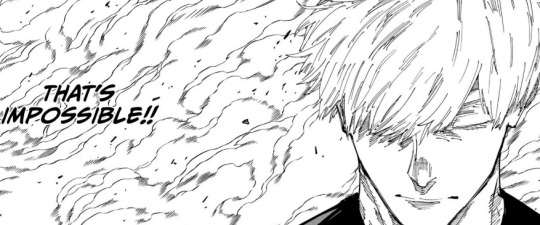
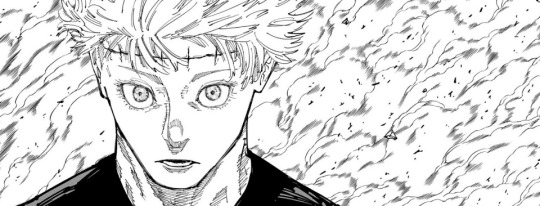
The Next Gojo Satoru
As you've probably guessed I have a lot to say about this chapter. However, right away I want to start out by pointing out once again that the fandom is taking a mostly gojo-centric view of this chapter. Which I understand it's Gojo's body that's being puppeteered around and dehumanized in the exact same way that Kenjaku one of the sickest and most inhuman characters used Geto's body.
However I think it shouldn't be understated how shocking it is to see Yuta betray all of his values like this. The most human character who represents love in the cast has given up on the cast and betrayed someone he loves. So let's talk about what this all means for Yuta under the cut.
GOJO GETS AN F IN TEACHING.
I understand why most of the focus is on Gojo, because yes Gojo's body is the one being violated here. He's not even allowed to rest in death after fighting on the front lines against Sukuna to the point where his brain was hemmoraging in the middle of battle and he was brutally cut in half.
Considering how much horror Gojo experienced when he saw Geto's body taken from him and made into Kenjaku's pupet. Cosidering the horrible pain that Nanako and Mimiko endured just seeing Geto's body still moving around denied a good death (Nanako and Mimiko were tellingly willing to let go and not try to take revenge against Gojo for killing Geto because of their friendship even though Geto was their whole world, but they'd never forgive Kenjaku for taking his body). Considering that Gojo even went out of his way to say he wanted to kill Kenjaku / Geto on Christmas Eve again in order to give him a proper burial it's understandable how horrifying this update is.
This is also a series where the two main antagonists are parasites who take the bodies, and steal away all bodily autonomy from characters like Yuji and Megumi and then force them to do horrible things they would never do and bear witness to it, such as the slaughter at Shibuya, or the murder of Tsumiki at Megkuna's hands.
It's understandable how people had such a visceral reaction to this chapter. However, I think the fandom has a tendency to paint Gojo like he's the central victim of all of Jujutsu Society when he's both victim and perpetrator.
Gojo is someone who has only been regarded as the strongest his entire life, and been used as a tool to keep Jujutsu Society stable his entire life. Gojo is also someone who never tried to be anything other than the strongest, never tried to empathize with anyone other than those who were just as strong as he is, and who raised all of his students to be tools too.
To illustrate my point here's an incredibly similiar character from Tokyo Ghoul: Arima Kishou. They are so similiar that they're both white haired mentor characters to the protagonist, they're both the strogest in their respective worlds, and Gege straight up copied this section of panels from the Tokyo Ghoul Manga.
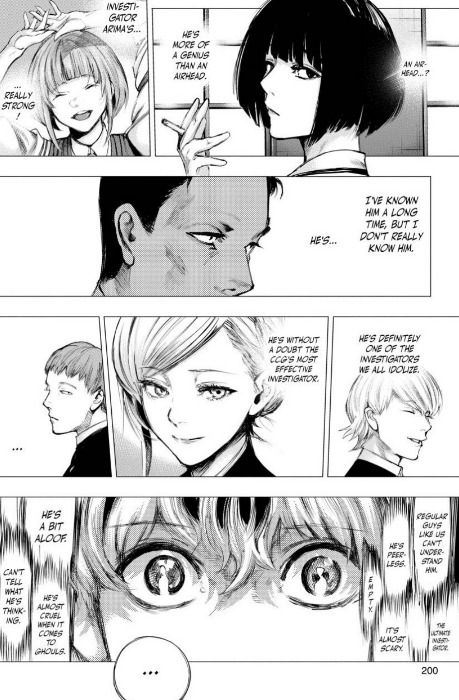
Arima is a breeding project, who was bred by the Washuu Family who mxies blood between humans and ghouls through a series of controlled marriages for the purpose of creating hybrid ghoul human children. Arima isn't the ideal hybrid they were looking for, but he was so ungodly talented he quickly rose to being the most powerful and well-respected investigator in the CCG.
However, this is how Arima reacts to the fact that his entire purpose in life was just to be a weapon to kill ghouls.
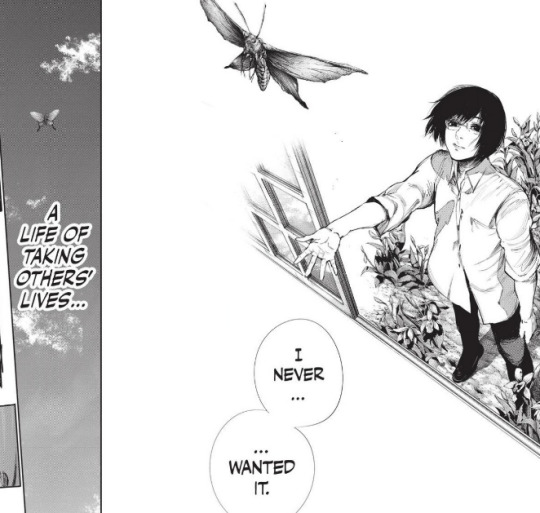
Arima loathes violence, he loathes being an investigator, he loathes himself most of all and designs his entire political revolution around him finally being killed by Kaneki - to punish himself and also to relieve himself of the burden of living a life where he was only meat to kill others.
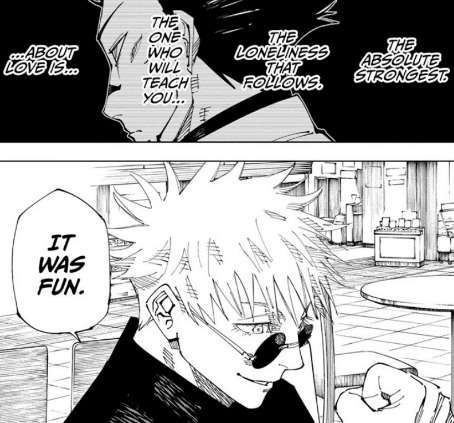
Gojo on the other hand loves being the strongest, he lives for Jujutsu. Arima's death is tragic and nihilistic believing his life had no real worth because all he ever was was a weapon to hurt others, whereas Gojo died satisfied.
Arima's last battle against Kaneki is grim, silent, and tragic, he does everything he can to make Kaneki despise him, to force Kaneki to kill him by being the worst version of himself and when Kaneki still wants him to live he just slits his own throat because even if Kaneki forgives him he can't forgive himself. Gojo laughs his head off and has the time of his life fighting against Sukuna, and going out in a blaze of glory.
Gojo dies smiling, Arima dies finally breaking into tears after a life of pretedig to be cold and emotionless. Gojo's dying regret is 1) that Geto wasn't there to say goodbye to him, and 2) that he wasn't able to draw out all of Sukuna's strength. Arima's dying regret was all the pain and suffering he caused throughout his life and how he was never able to rise above his circumstances and be anything other than what he was born to be.
These two characters are incredibly similiar, they are both the strongest, and they were both made into tools by a dehumanizing system they were born into. However, their attitudes are entirely different. Gojo enjoys being strong, and yes part of it is that Gojo himself doesn't realize he's a victim or what society has groomed him into becoming, but the other part is just because it's an ego trip for him. Gojo doesn't see himself as the tragic victim his fandom makes him out to be.
If you were to transplant him into Tokyo Ghoul Gojo would be happily killing ghouls, and he would think killing ghouls is fun because he's the strongest and best at killing ghouls. This is the complexity that is Satoru Gojo, he has been dehumanized and put on a pedestal his ow life, but Gojo also enjoys being on that pedestal and won't ever step down from it willingly.
I'm not saying that Arima is a better person than Gojo. I think the fact that Gojo doesn't think of himself as a victim is tragic in its own right, because he lacks the self-awareness to actually grow and change as a person. In the end both Arima and Gojo believe they couldn't be anything better than what they were, and their only release is death which is just insanely sad to me because as long as the future exists people always have a chance to get better no matter who they are. To give up on the future, to see an early death as a good thing simply because you can't endure life any longer is one of the most hopeless things imaginable.
Gojo's not sad because he was born to be a tool exploited for society's benefit, he's sad because he was lonely. He doesn't even realize it's his own darn fault he's lonely, because not only has Shoko said that he's not alone she's always been right there, but this chapter we get a repeat of Gojo's students begging him to let them in and Gojo himself decided to draw that line between himself and others and thinking an enlightened, godlike being like himself can't possibly be understood.

All of this to say I think Gojo is the sole victim here, but he's the middle of a chain of of victimhood. I think ultimately the biggest victim here is Yuta, and yes I will not only play trauma olympics here I'm going to win.
If this chapter goes to show anything it's that Gojo has completely failed in his ideals of protecting the youth from the dehumanizing system of sorcerers that takes children and reduces them to cogs in a machine.
A lot of people criticize Jujutsu Kaisen for dropping basically all of its political elements and themes of reform in the second half after Shibuya, and while I understand the criticism I think Gege intentionally shifted away from politics because Gojo's political revolution was never going to succeed.
From the beginning Gojo's solution to reforming Jujutsu Society and it's habit of taking away the youth of children and raising them up instead as child soldiers is... to make stronger child soldiers.
This is Gojo's blindspot and it has always been Gojo's blindspot.

It's why Gojo is completely okay with someone like Mei Mei who at the best uses her brother as a human shield to get out of curse domains and has stolen his entire childhood away to make him own pet little shoulder, and at worst actively molests him.
It's why Gojo is stated in the databooks to have only taken an interest in Megumi and Yuta because they were strong.

Gojo understands that he's being exploited by Jujutsu Society, but doesn't understand you need to deconstruct unfair systems of power and exploitation in order to build something better. Gojo from the beginning only had one plan, and that was to replace the people at the top with his own allies who'd support his agenda. He just thought waiting for them to die out and the children to grow up was the more peaceful way of doing it.
Gojo's political revolution was doomed from the beginning and that's why we see him go back on his word this chapter and just slaughter everyone at the top. His choice of a new leader for Jujutsu Society is hardly better than the elders, the person who executed Gojo's teacher and tried to get all the children to kill Itadori early on. Good choice.
This is what Gojo said would happen though, if he just wiped everyone out at the top no real systemic change would occur because they'd just be replaced with someone who wasn't that differet. Gojo's just given up on the notion of lasting change out of pragmatism.

Which is why Gojo himself is not that different from the elders in the first place, not because he's a bad person but because he was shaped by that same society and he's the pinnacle of that society.
I think the thing is and this point often gets ignored - a lot of the choices the elders make are because of outdated traditions like choosing to oppress Maki and Toji just because they challenge the traditional notions of cursed energy.
However, some of the decisions they make are out of cold hard pragmatism. Gakuganji actually turned out to be right in his assassiation attempt against Yuji Itadori. If they had succesfully killed Yuji, then the massacre in Shibuya would have been prevented and likely Kenjaku's plans would have been pushed back. The elders didn't sentence Yuta to execution just to be cruel, or just because they're superstitious but because he's already had several incidents of nearly killing people because he can't control Rika.
It's easy to dismiss the Elders as evil because they're just faceless entities, but then we witness in this very same chapter the main characters making the same heartless decisions out of the same sense of pragmatism.
Gojo understands Jujutsu Society is flawed, but doesn't understand exactly why it's wrong. He doesn't raise his students to be independent free thinkers because then they might question him, he raises them to be very powerful because that's more pragmatic.
Here are the next generation of sorcerers who are going to bring about the change to Jujutsu Society that Gojo so desperately seeks.
Nobara Kugisaki: Dead
Hakari Kinji: His greatest ambition is to start a fight club
Yuji: Actively calls himself a mindless cog and just wants to kill whatever society points him at and tells him to kill.
Maki: Mass murderer.
Yuta: Just stole Gojo's body and said he had to become a monster i Gojo's place.
Megumi: Begging to be killed.
Inumaki: Tuna Mayo
Panda: Is a Panda
(Joke lovingly ripped off from @kaibutsushidousha)
I understand that fighting Sukuna takes precedence now, but do you think once the dust settles any of these characters are going to do anything to make lasting change?
Are we going to see anything for them at the end of the road other than a mountain of their fellow sorcerers corpses?
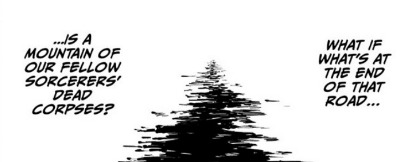
Gojo didn't nurture his students to grow into healthy adults, he raised them into stronger child soldiers and yes that's the pragmatic thing to do to help them survive in the Jujutsu World, but the elders make those decisions out of cold pragmatism as well.
MHA is also showing a story where the children are failing to learn from the previous generatio's mistakes, but it's far less frustrating to watch in JJK because it almost seems like that's the point?
Maki sacrificed Mai for the sake of becoming someone strong enough to reform the Zen'in Clan, only for her sister to die and Maki to slaughter the rest of her family failing in both her goals to reform her clan and protect Mai.
Yuji became the host of Sukuna in order to help others, because the total deaths of people in the world would go down if he ate all the fingers. Not only did that decision lead to the death of thousands in Shibuya, but he's even lost his role of being Sukuna's host to Megumi.
Yuta wanted to find a reason to live and a purpose in protecting his friends, and also wanted to pay back the man who saved him, not only is Yuta choosing to die in a way that breaks his friends heart he's also violating his beloved teacher's bodies.
There's a lot of arcs like this where characters fail in what they set out to accomplish, because like in most tragedies they don't try to grow as people they only care about getting stronger. It's the same choice over ad over again, a decision made of cold pragmatism that brings about their tragic ending.
I think it speaks to why systems like this perpetuate themselves, because it becomes so hard to hold onto your humanity that even trying gets you actively punished all the while people like Mei Mei crawl to the top. However, even if you throw your humanity away purely as an act of survival you're still helping perpetuate that system instead of fighting against it.
Anyway, that's enough hating on Gojo, onto the main event.
THE NEXT GOJO SATORU.
It's almost masterful how perfect the foreshadowing for this chapter's twist was. Yuta sharing a common ancestor in Sugawara with Gojo.
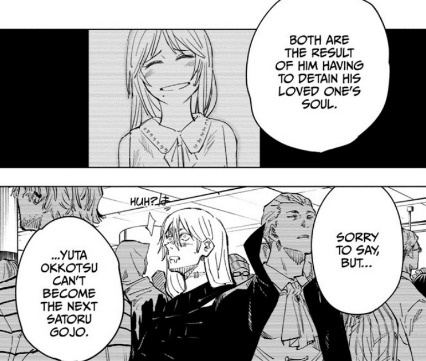
The irony that Kenjaku said out loud that someone like Yuta could never become Gojo, on top of the fact that Yuta's true power comes from detaining his loved ones soul. He's turning Gojo's body into a weapon the same way that he once used Rika's vengeful cursed spirit as one (he even channels her strength into a sword, the same way Maki uses the sword that Mai gave her life to create in battle).
The way that Yuji's first impression of Yuta from his powerful presence and cursed energy alone was calling him someone even creepier than Gojo.
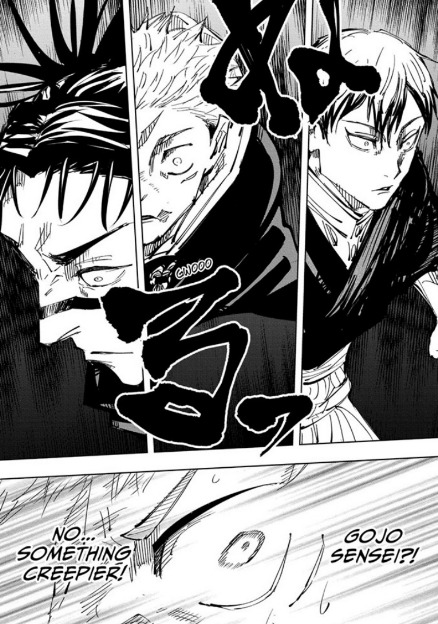
The idea that Kenjaku has been trying to get his hands on the six-eyes for years, which is what led most of the fandom to theorize a possible Kenjaku return by stealing Gojo's corpse. The fact Tengen said the six eyes, himself and the star plasma vessel are all connected and one time Kenjaku killed the six-eyes from a child only for another one to appear right away.
Yuta being told he could never reach Sukuna's heights because he lacks the selfishness of a calamity.
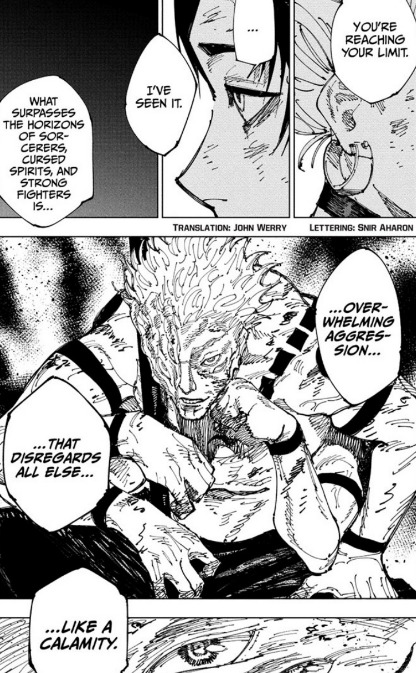
Even Yuta trying to tell a nameless assassin Uro to be less selfish, only to be chastised by her for not understanding because it's impossible for someone as blessed as he is to know what it's like to not have a name, to not have a face, to not be someone important.
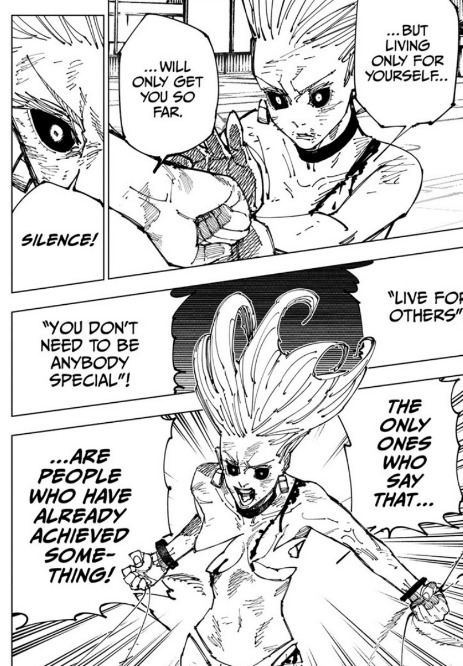
Now here Yuta is, not only is he making the selfish decision to use his teacher's body as a tool, he's also most likely in five minutes going to die in someone else's body, having sacrificed not only his name, and face, but also his personal values in order to become a monster.
This arc makes it seem like Yuta's gone against everything he's stood for, making his arc a complete circle from Jujutsu Kaisen Zero and that's kind of the point. Heck, even something as small as Yuta's decision to show mercy to Ishigori was rendered pointless because Sukuna immediately killed him soon after taking Megumi's body.
If Yuta's regressed in his character it's because Gojo's purpose was not to raise these children into healthy adults, but strong soldiers.
What happened to Yuta is a direct consequence of the way Gojo recruits these children, and the underhanded motivations he has behind those recruitments.
Yuta's decision to take Gojo's body is more tragic on Yuta's part then it is on Gojo's, because Yuta is a child, and Gojo is an adult.
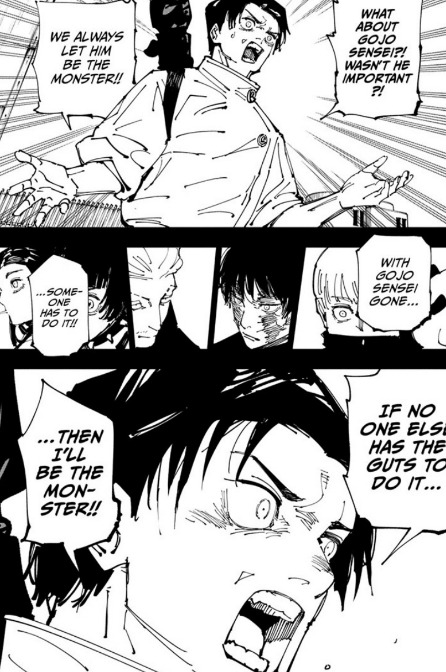
It is sad that Gojo is all alone, that he's forced to become a tool to society, but Yuta shouldn't be the one who feels responsible for that. Gojo is supposed to protect Yuta, he's the adult, the teacher, the one with power and Yuta is the child. Yuta is not the one who should be making this speech because it is not Yuta's responsibility to do any of this - but Yuta thinks it is because he owes Gojo.
However, when Gojo recruits people it's with the unspoken implication that they now owe him. He wants them to feel indebted, because then they'll be easier to use as pieces in his intended political revolution. We see this blatantly with the way he recruited Megumi.

I'll make sure you and your sister don't starve but you owe me in the form of labor later on in your life.
Gojo saved Yuta because he thought Rika was powerful and the elders were foolish for executing a potentially powerful sorcerer for THE GREATER GOOD instead of teaching him to control his power out of fear. Gojo recruited Yuji, because someone with Sukuna's power and who could eat his fingers as a vessel had the makings to be an incredibly powerful sorcerer. Gojo didn't even think of Megumi until after Geto defected, and Gojo decided he needed to start making changes to Jujutsu Society.
While Gojo's pragmatism is understandable to a point it also poisons his more nobler intentions. Since Gojo expects payment in return when he sticks his neck out for people, because these children are assets first and children secod.
I think Gojo likes Yuta. I think he gets along with him well. Yuta clearly respects him as a mentor. He did in fact go to great lengths to save Yuta from execution. He was right that it was more ethical to teach Yuta to control his powers rather than execute him for the danger he might represet. He even gives Yuta emotional advice a couple of times.
However, if Yuta was just like a grade 4 sorcerer with no special talent I doubt Gojo would have blinked at his execution. He sees Yuta for his talent first, and his potential to become someone like him. If anythig there are clear comparisons to both Megumi and Yuta. They're both prodigies born with incredible techniques, but Yuta is a lot more receptive to Gojo's grooming than Megumi is who's too traumatized to function. Gojo's not just grooming Yuta into being a powerful sorcerer, but another version of himself.
So it's almost karmic that not only does Yuta basically turn his back on everything that makes Yuta himself (his love for people, his desire to live and be surrounded by others), he also does so by literally becoming Satoru Gojo and transplanting his brain into Gojo's body.
Because Yuta is despite possessing a similiar level of talent as far from Gojo as possible. Gojo is not well liked by his comrades, he's there because he's needed due to his power. Yuta on the other hand has everyone vehemently disagreeing with his backup plan in the event of Gojo's death because they don't want to lose him.
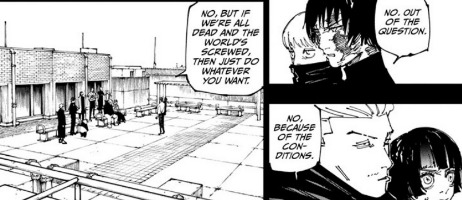
People need Gojo, they want Yuta because of the connections that Yuta has made with them and because they care about Yuta as a person. Gojo is someone who deliberately draws a line between himself and others because he believes the strongest can't be comprehended, Yuta only fights for the sake of being accepted by others because he needs their approval in order to live.
Yuta's now turned his back on those two things, his tendency to put his loved ones first, and his desire to live, both because he feels he owes Gojo.
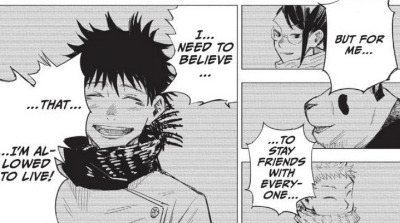
This comes about because of two factors, number one Gojo helping him with the implication that this help means that Yuta owes him something which makes Yuta desperate to pay him back and therfore easy to mold, and number two Gojo's intentions to begin with to take Yuta and make another Gojo out of him. To make a successor who would carry on the same burdens that Gojo did.
Gojo succeeded one hundred percent in making his successor as opposed to Megumi who turned out to be too different from Gojo i the end. He took what make Yuta unique and ironed out all those wrinkles until he was left with someone willing to make the same inhumane, pragmatic decisions that Gojo was.
I think it's tragic that as much as Gojo wanted to make things better for the next generation, he basically led Yuta down the same road he did, to make the same choice to throw his humanity away along with all of his loved ones. Especially since Yuta started out in such a different place.
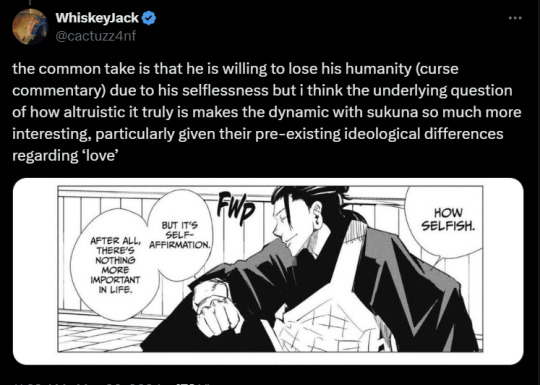
Yuta has learned to become selfish like Gojo, because selfishness is apparently now the only way to get by in this world. A cycle that has been started with the elders, and continued on with Gojo, remains unbroken as Yuta becomes just another link in the chain. Yuta's likely going to die in a stranger's body, leaving all of his friends behind to mourn him, but even if he lives what life will that be exactly?

It speaks to the arcs in Jujutsu Kaisen that they're all kind of circles at this point. We have this heartwarming goodbye of Rika telling Yuta to live, and Yuta's whole arc was to learn to try to live without Rika and make new friends, but it's now likely goig to end with Yuta dying a year after Rika finally moved on.
Choso was told to try living on as a human and Yuki even sacrificed her life to give him the opportuity to escape the fight, and he only lived a month longer to die right in front of Yuji's eyes.
Gojo put all of his hope in the next generation, but now not only did he put all the power in Gakuganji's hands but he ended up dying a year after Geto did just like Yuta will likely die a year after Rika.
I think these character arcs are turning out to be circles because the characters aren't actually doing anything to try to break the cycles that they're trapped inside of - they're only trying to get stronger. Which is why they end up resembling the actions of the villains, Yuji becoming more curselike, Yuta stealing Gojo's body the way Kenjaku did with Geto's.
It reminds me of a quote from Critical Role that I absolutely adore.
“I have just taken an audience with the Raven Queen who has snuffed any hope of my redemption, for which I am truly grateful. With new clarity, I can finally see my life as a series of compounding, poor choices.” Vax winces. “There was nothing I could’ve done to save my family, yet I still sold my soul in search of vengeance. Later I allowed Ripley to leave, knowing full well she was a greater threat to the world than the Briarwoods would ever be. I traded the world’s safety for the belief that I could murder my way to peace; that if I could be a greater horror, it would bring my family back. And once this lie was shattered I scrambled to find asolution, to make a deal, to undo my mistakes and balance the scales. I nowunderstand that there are no scales, there is no redemption, and no ledger that judges me good or evil. I am free to simply be myself and live with the terrible mistakes I’ve made."
Especially this sentence: I believed I could murder my way to peace; that if I could be a greater horror, it would bring my family back.
Maki is a character that I have not found all that interesting in a while because she committed such a huge mass murder, only for it to have no consequences in the narrative and never be mentioned again, but this chapter she suddenly became an interesting character again.
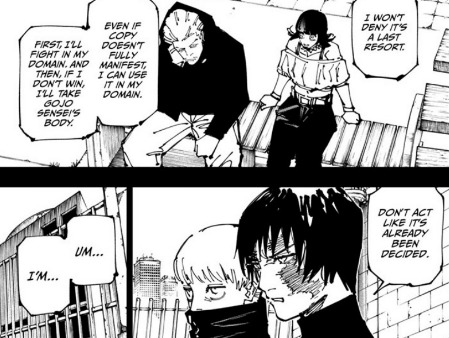
Maki who lost everything but gained strength, doesn't seem all that bothered by the loss. People compare Megumi's reaction to losing Tsumiki to Maki's reaction to losing Mai, but Megumi's reaction is much more interesting because it's always better to see a character be weak and fall apart then to be strong and power through things.
However, maybe the reason Maki hasn't experienced any grief at all towards Mai and has instead delighted in her newfound strength and independence is because of this, because she still had Yuta.
Maki is a character who's not really said anything other than exposition the past like twenty chapters, but now she's the most vocally against Yuta sacrificing himself for the greater good. Yet this is against Maki's own ideology of doing everything you can to be stronger, to win. Maki was always about individualism, not about friendship or the bonds between others, she severed her own bonds to be free. Yet, she can't stand to see Yuta do the same thing as her, to become more like her.
This might be the consequence of Maki's continued choice to value freedom and the power to achieve that freedom over all else. Now, the one time Yuta is trying to throw away the same things that she threw away she can't say anything meaningful or convince him to stop him.
Which reminds painfully of this chapter as well.
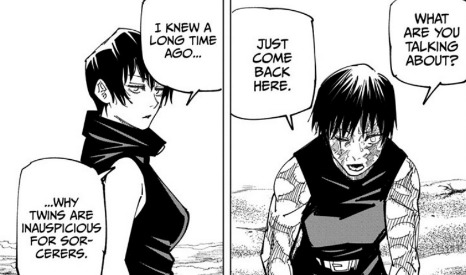
Mai killing herself in order to free Maki from cursed energy is an obvious parallel to Sukuna devouring his own twin in the womb, but the difference is in this situation Maki didn't want Mai to go, she begged her not to. However, just like with Yuta there was nothing Maki could ahve said or done by that point to convince Mai to stay. Maki has always chosen power over her sister, she's always abandoned Mai, so what exactly can she say to convince her that she cares more about Mai more? That her dream of defeating the Zen'in and having revenge against them isn't worth the price if it comes at the sacrifice of Mai?
Maki didn't want to abandon Mai, or for Mai to sacrifice herself, but tragically her every action indicated otherwise. It all comes down to this: I believed I could murder my way to peace; that if I could be a greater horror, it would bring my family back.
Maki seems to have achieved peace by murdering the Zen'in, but we see the same kind of circular arc that we have for Yuta.
Maki gave up on everything for strength, but Maki's not strong enough to finish Sukuna then and there, forcing Yuta to sacrifice himself the same way Mai did.
Maki can't talk Yuta out of making that sacrifice, or come up with any convincing argument with why he shouldn't because of all the choices she's made before this.
Maki chose to murder her way to peace, but it came at the cost of her humanity and growth and thus she's faced again with the exact same situation with Mai and she's forced to watch her heart be taken from her again.

It goes to show that we think these characters are getting stronger but they're actually sacrificing something vitally important.
These characters are just going to keep going around in circles and you have to wonder just when is it going to stop?
623 notes
·
View notes
Text
welp. accidentally deleted the question anon. so i'll answer it in a post.
is satosugu queer baiting? i think they're queer coded. if they were queer bait or, probably more accurate to japan, fujoshi bait there would be a lot more fanservice. i'm talking like in black butler or more obviously "kiss him, not me". or when animation studios do heavy leg work for a ship in shounen.
which, actually—
with all the anime only moments in jujutsu kaisen, this is one of the criticisms held against satosugu. ppl insist that the narrative is being twisted by MAPPA to feed shippers. but the difference lies, in my opinion, on how closely gege was involved in the production of gojo's past arc and the praise he has for it.
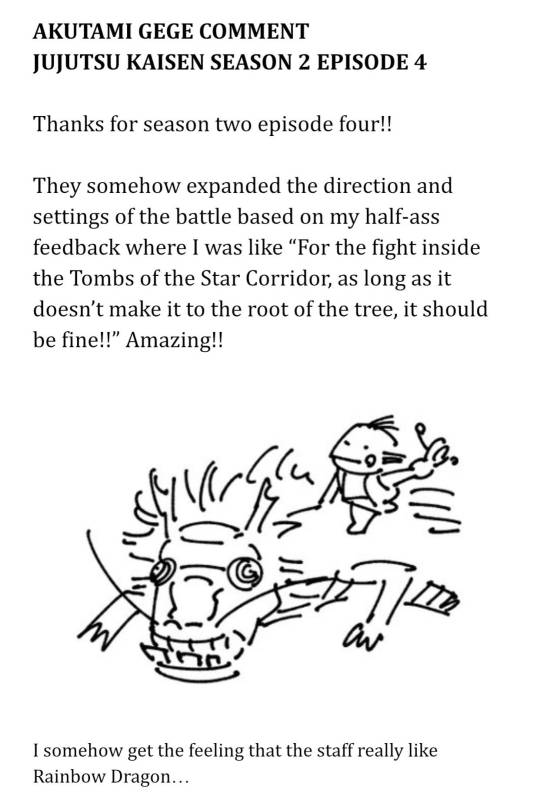
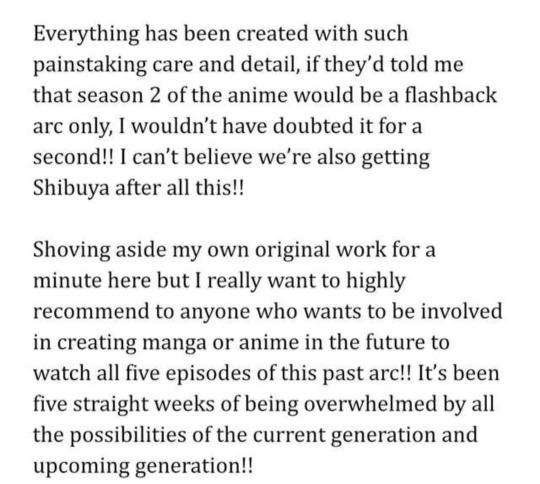
satosugu is also a ship that can stand on its own with the source material. especially after chapter 221, when i think gege decided to commit to them? it was around a month or two before the anime was released, and it also coincided with tokyo rainbow pride which i think is a fun tidbit. considering gege can be very particular about dates sometimes. he also decided to bring up how romantic dec 24 is— as well as gojo's decision to fight that date.
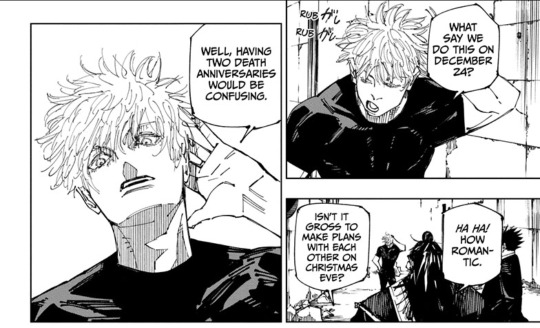
i think for the longest time gege was unsure whether to double down on what he sort of set up between them in jjk0 (that was written as a standalone). which is why the hidden inventory arc/premature death arc is ambiguous, and he toes the line in shibuya.
with gojo's sealing, gege, on top of many other things, basically had three years to think about the direction he wanted to take gojo and geto's relationship.
and he arrived at this:
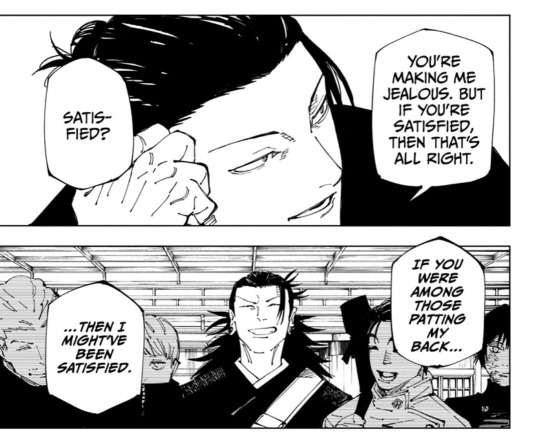
which i think is more of a hint than bait. who knows what else is in the future?
146 notes
·
View notes
Note
Hi! I have a question, I hope I can explain myself: how would you describe Gojo on a moral level? I see the majority of the fandom (jjk in general, not just the shipping ones) considers him a good person, but I'd argue he's more on the grey side...and not a light grey. See, I can't really wrap my head around the way he blatantly ignores the fact the Suguru was completely fucked up, to the point that in chap 236 he wishes Suguru was with him before fighting Sukuna and imagining him (adult Suguro, the fucked up one) together with the same students he tried to kill in jjk0. How on earth? If I'm not mistaken Gojo never really says "yeah, Suguru was my friend but he used to be completely different, this is not the Suguru I used to be friends with". He never says Suguru was wrong. He just misses him, even though he was surrounded by people who liked him. At least Shoko clearly doesn't feel any affection towards Suguru. And let's not talk about the way he doesn't really seem concerned about the future of his students in chap 236. What do you think? Just to clarify: I do like Gojo. But I don't share the sentiment of the rest of the fandom: he's not a good person. I guess Nanami was right
i sort of explained how i think gojo sees the matter of suguru before but it's buried in my blog since i don't tag properly so to any one else reading this i might be repeating myself.
to gojo the "suguru he knew in hs" and the "suguru he killed" are one and the same. i don't believe gojo is the type to draw hard lines like the average person since he is "enlightened"— as his name (satoru) suggests. "past" suguru is at his core the same as "future" suguru. to him the person suguru becomes doesn't exist in a vacuum (his path is ultimately a product of their society). in other words, to gojo the distinction lies not in what suguru did, but who suguru is (gojo doesn't conflate actions with the "self"). i think this is how gege, who seems to be an overthinker, looks at the whole thing anyways. the matter doesn't boil down to "good" or "bad".
and the thing is gojo loves suguru at his core (or i choose to interpret it that way anyways). gege frames him as gojo's "one and only friend" for a reason. i think he's the only person who ever really made gojo feel that he was "just like everyone else."
being "liked" by others (and even reciprocating those feelings) doesn't help fill the gap gojo felt from losing suguru. gojo's simply been growing around the loss. i think this diagram explains gojo's sentiments best:

i also don't think that gojo's unconcerned for his students so much as choosing to be an optimist (once more, which aligns with his progressive ideals too),
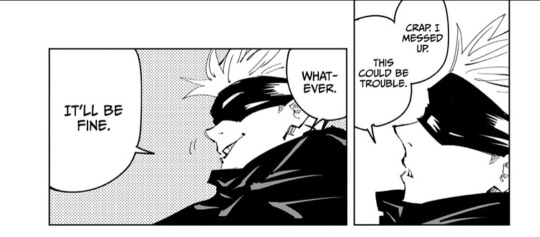
honestly, there's not much left for gojo to do beyond the grave either.+he really went all out. he didn't exactly roll over and die haha there was a possibility his own hollow purple might kill him but that was a sacrifice he was willing to take to beat sukuna, for his students sake... but also because he was feeling experimental
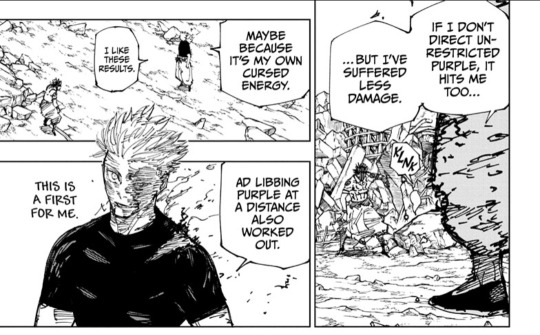
in any case, if you look at his desires, sukuna wasn't even his priority,

in conclusion: i don't think gojo's a bad person or that nanami even implies that in ch 236 haha i think he's shown to be human (he loves to fight despite everything and he fails to connect with others).
sukuna even calls gojo greedy two chapters later. that's a very human trait. the thing is sukuna is technically right too because despite all gojo's power, wealth, success, and the people who like him— there's only one thing he wanted (geto by his side),
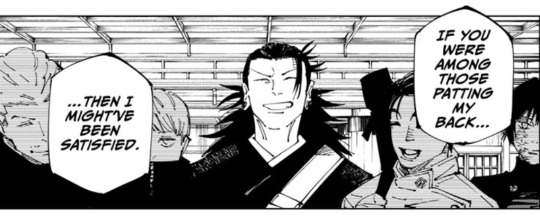
tldr: it's complicated. gojo's doing his best lol hope that makes sense?
52 notes
·
View notes
Text
If Geto and Gojo were so close, why didn't Geto try to convince Gojo to defect with him?
Because Geto knew that Gojo’s support would guarantee his success, but that success would come at the cost of hurting Gojo.
I believe that Geto cared more about protecting Gojo than he cared about building a better world.
..
Let me explain…
First, let’s talk about why it would’ve made sense for Geto to ask Gojo to join him:
(1) Gojo would’ve been Geto’s most important / most powerful ally
By the time of Geto’s defection, Gojo is already the strongest sorcerer in existence. He and Geto are two of only three special grade sorcerers. Having them both on the same side is essentially an automatic win.
(2) Gojo should’ve been (relatively) easy to persuade
Gojo had already told Geto that he didn't like having to save the weak and didn't care about the moral justifications for it…
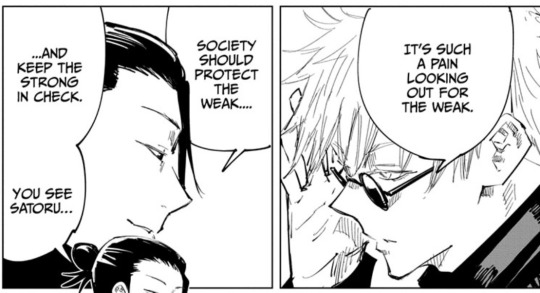
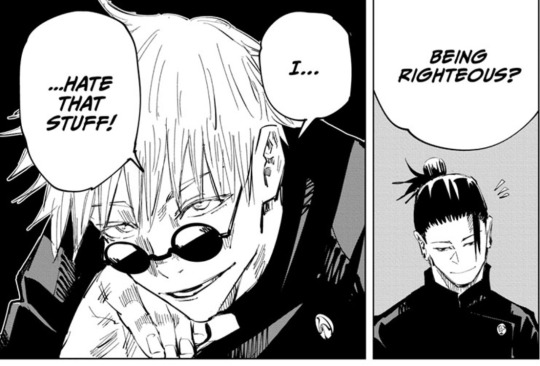
…Geto has also seen that Gojo doesn’t always value / protect human life. He was ready to massacre the Time Vessel Association without reason, but ultimately he didn't, because he deferred to Geto's judgement…
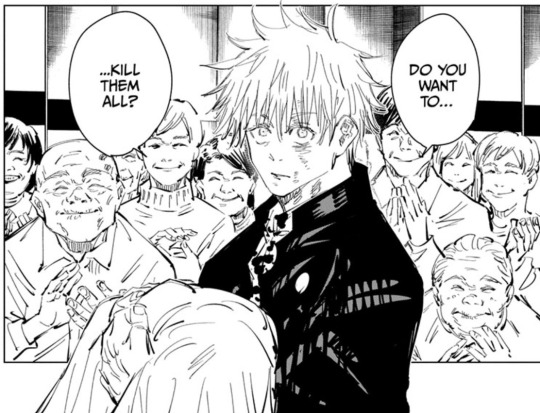
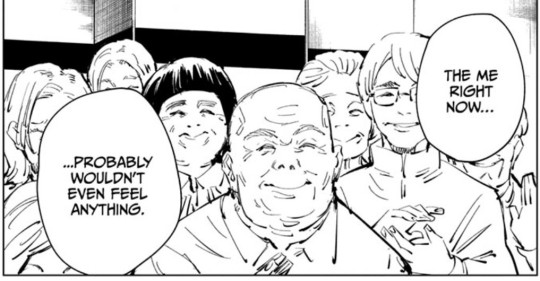
…and, most importantly, they are best friends on a DEEP, unparalleled level. Geto is Gojo’s “one and only” best friend.
If Geto was truly dedicated to changing the world order, Gojo should’ve been the first and most important person that he tried to recruit to his insurgency / cult / mission.
BUT
Not only does Geto make zero effort to reach out to / recruit Gojo, he actively avoids him and pushes him away...
- - - - - Keep reading cut - - - - -
After he kills the 112 non-sorcerers, Geto runs into Shoko in Shinjuku. He happily approaches her and willingly answers her questions.
Look at his smiling face in their interactions:
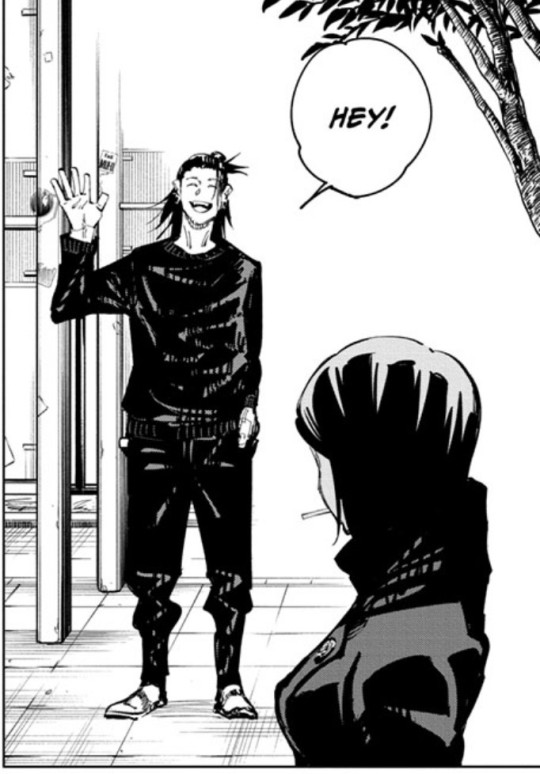

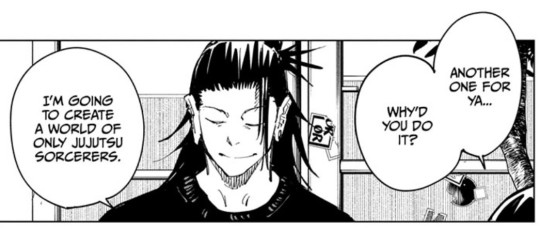
But, when Shoko calls Gojo, Geto leaves before Gojo shows up. Gojo tracks him down anyway and demands an explanation. Geto still doesn’t want to talk about it (“You already heard it.”)
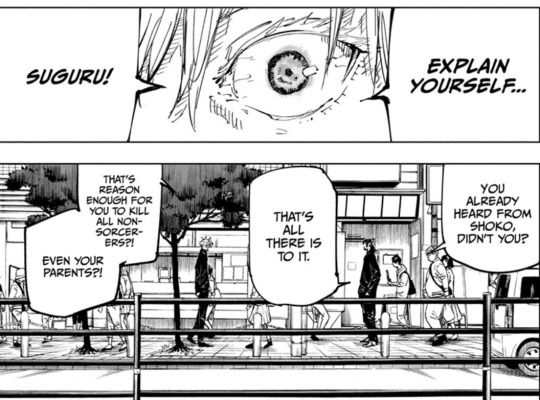
It's strange, right? Geto loves talking about his vision of a better world with everyone else.
Then, there is this confusing progression of dialog:
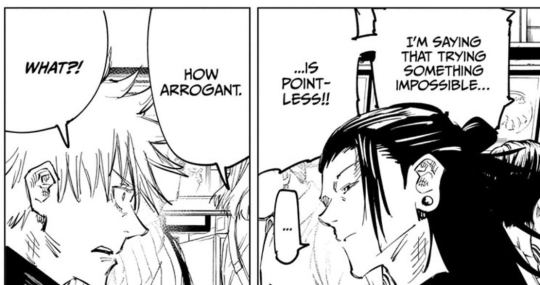
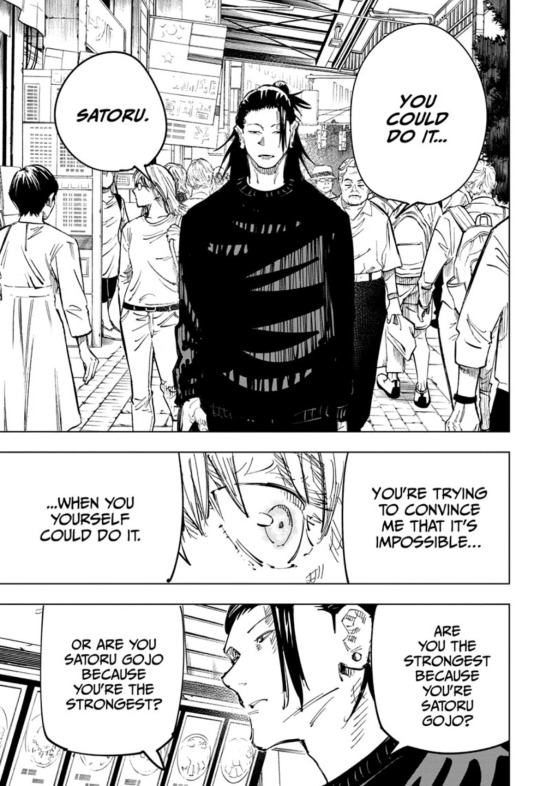
Geto is hurt/annoyed that Gojo doesn’t believe in him, so he points out that Gojo’s argument against his plan is invalid. The plan is possible (“You could do it”), therefore (according to Gojo’s own logic) it’s not “pointless.”
In a way, Geto is admitting that he knows it would make the most sense for Gojo to join him.
But before Gojo can respond, Geto pivots to saying something extremely hurtful. He's questioning who Gojo is / would be if he wasn't the strongest. Is there really anything more to him? (See more detail in my post here).
Then, in the very next panel Geto turns and starts walking away.
In summary: (1) Geto avoids Gojo, (2) Geto only argues in favor of his plan when Gojo forces/baits him, (3) Upon invalidating Gojo’s opposition to his plan, Geto immediately puts emotional distance between them, (4) Geto then puts physical distance between them.
Why is Geto trying so hard to make sure that Gojo won’t follow him?
Is he just being prideful about doing this on his own? Is he so angry at Gojo's arrogance that he'd jeopardize the success of his life's mission over it?
These arguments aren't in line with Geto's characterization / known motivations (see the end of this post, if you're interested in more on that.)
Geto's main motivation is (a twisted form of) compassion. He wants to end the suffering of sorcerers.
He is a thoughtful, contemplative person, and would've thought about the ramifications of recruiting Gojo.
What are the ramifications?
If Gojo joins the cause, Geto’s plan would succeed, but Gojo would suffer for it.
Like anyone who joins Geto's cult, Gojo would become a pariah / fugitive from Jujutsu society. He’d kill people. He’d kill other sorcerers.
But because Gojo has the singular level of strength/ability to kill non-sorcerers en masse, he would commit the vast majority (or all) of the murder / destruction. The legal, social, and mental impacts would be most severe on Gojo.
(Also, at this point, I think Geto may still question whether he’s made the right choice. It’s difficult to go from a hardline stance on protecting non-sorcerers to wanting to gen0c1de them, within the span of a year, without any lingering ethical qualms. So he may be worried about moral costs to Gojo as well.)
Let’s remember that Geto (canonically) deeply loves Gojo. Gojo is his one and only best friend. Geto worries about Gojo when he overworks himself protecting Riko. Geto is shocked when Toji kills Riko in front of him, but he only flies into a rage when he thinks Toji has killed Gojo. (Again, see my post here for more on how much Geto loves Gojo).
So, it makes sense that Geto is ready to make sacrifices to create a better world, but it’s a cost he’s willing to put on his own head. Not Gojo's.
Ultimately, Geto cares more about Gojo than he cares about achieving the mission he has dedicated his life to.
The last thing Geto says to him is this:

What he's really asking Gojo is: "Have you stopped loving me, now that I've committed myself to this dark path? Would you kill me to save them?"
If Gojo hates Geto enough that he’d kill him, then Geto never had a chance of recruiting Gojo in the first place.
Of course, Gojo can’t make himself hurt Geto. He still loves Geto too much.
Geto protected Gojo by pushing him away.
___
Addendum:
I'll also argue against two other possible explanations for Geto's behavior.
(1) Geto is jealous / prideful /wants to build his own legacy without Gojo stealing the spotlight
Geto has clear motivations for his goals and they’re not egotistical. He wants to end the suffering of sorcerers caused by non-sorcerers’ existence (e.g., Riko’s death, Mimiko & Nanako’s abuse).
Geto’s pride isn’t hurt when Gojo becomes the strongest. The only thing that bothers Geto is that they’re getting sent on separate missions.
After Gojo becomes stronger that him, Geto still has overt affection for Gojo (e.g., he asks Haibara to bring back sweets from his mission so he can share with Gojo).
Although Geto does believe in his superiority over non-sorcerers, he doesn't feel superior over other sorcerers and doesn't struggle with his 'inferiority' to Gojo.
Does Gojo’s lack of faith in Geto’s ability (calling his goal “impossible”), spur Geto to want to prove himself? Yes, probably. But Geto had already been avoiding Gojo before he said that. And I don’t believe that wanting to prove himself to Gojo would overshadow his stronger motivation to build a better world for sorcerers.
(2) He thinks Gojo actually is too moral to join him
After Geto kills the 112 non-sorcerers, Gojo is shocked and upset by what’s happened, but not once does he insult Geto or imply that Geto has done something unforgivable. In fact, he’s practically begging Geto to explain himself because he wants to be able to justify his actions. And, again, Gojo’s argument against Geto’s plan is NOT that “it’s wrong,” it’s that “it’s impossible.”
924 notes
·
View notes
Text
gege akutami was like yeah these guys break up in front of a kfc which is what everyone eats on christmas eve in japan and christmas eve in japan can also be a romantic holiday and one of the guys is forced to kill the other guy on christmas eve when they meet again after 10 years and he calls him his one and only and then a year later an evil sorcerer possesses his dead beloved’s body and he arranges a fight with him on christmas eve the romantic holiday and anniversary of having to kill his beloved and then he DIES HIMSELF and the first thing he sees in the afterlife on CHRISTMAS EVE THE ROMANTIC HOLIDAY IN JAPAN is his beloved’s face and tells him he is satisfied with his life except that he would’ve wanted him there and people are like “yeah its just queercoding or theyre just friends” my brother in kentucky fried christ thats not coding thats just gay and you cant READ
2K notes
·
View notes
Text
happy 12/24-25! i think too often about the “gege hates gojo” jokes because holy shit it is PERSONAL with gege
like yeah he sealed him and killed him but like. every aspect of gojo’s character is just so. gege really said “i’m going to make you the strongest character in the history of ever and you’re going to be cool and attractive and funny and your fans will love you, BUT:
The entire point of your character is that no matter how much power you have, you are helpless to save the people you truly care about
You’re so powerful that the only way you can narratively exist without destroying every enemy in jjk other than Sukuna is to get snatched away, sealed, get your powers taken away, or die (even in the fucking video game you only get a certain number of turns to act before you get yoinked)
You can never escape the system you were born into because your power has become your character
You’ll think you’re changing the system for the better but end up perpetuating the system anyway in allowing children to go on dangerous missions
You cannot supervise said children on dangerous missions because you’re running around Japan like a headless chicken at the whims of the higher ups
You never got the chance to fully grow up because a part of you died when Toji killed you and a part of you died when Suguru left you and what else is there left
Your own desire for power blinded you to your best friend’s depression and it’s one of your greatest regrets yet a part of you still thinks Suguru wasn’t strong enough to keep up which is why you keep saying you want strong allies who can keep up with you and you are just terribly equipped to handle your students’ emotional challenges and insecurities even though you try your best
You will never make any emotional connections as lovely as the one from your youth which you still cry about on the rare occasions you actually sleep
You will only be able to tell Suguru you love him right before you KILL HIM
No matter whether Suguru was your best friend, ex-boyfriend, crush that you never confessed to, or boy you only realized you were in love with after he left you, you will NEVER be able to get over him and an evil brain will use this against you and several people you care about will get fucked over because you cared too much
Even though your students/coworkers sometimes like you the first thing 99% of them think of when they think of you is “The Strongest” and even in your breakup arc Suguru, the one person you wanted to stand by your side and share the title, began to think of you in that way as well and distanced himself from you because of it.
The narrative requires that you be lonely at the top as a direct consequence of your power - even metaphorically, infinity separates you from the rest of the world and your wide range of destruction makes it so allies are a hindrance in battle and you could destroy the people you dare about in seconds (see: thank fuck todo stopped yuuji from stepping into range of purple)
You are going to fight the boy you may or may not have raised from childhood because of the other boy with Sukuna inside him that he asked you to save and you can’t hesitate because the last time you hesitated about someone you cared about you got sealed and people died
You may or may not have died to the strongest curse of all time and are left forever unsatisfied even in death because not only was your culty/cunty best friend not there to cheer you on, but you think Sukuna couldn’t even go all out against you, the strongest sorcerer of your time, despite strength being your whole thing
and as a bonus, you also “died” after cockily saying “Nah I’d win” which will get extensively memed on the internet at your expense”
like not to woobify gojo or anything but oh my god jesus fucking christ gege
he was like “ill make you hot as a treat mostly for myself because i like drawing hot men but you’re going to be so incredibly fucking doomed by the narrative in every possible way”
like he loves drawing shirtless men but he never drew gojo shirtless like gege!! GEGE!!!! what did he DO to deserve this level of narrative ire omfg
342 notes
·
View notes
Text
on my satosugu bs
0 people asked, but i am such an insanely firm believer in 'geto fell first, gojo fell harder' and no one will ever convince me otherwise.
we don't see them when they first meet, but it's pretty natural to conclude that geto would've fallen first because why would it have been gojo? likely sheltered, self-centered, god-complex gojo? nope. i think it's pretty easy to fall for gojo, from geto's perspective, and it would've taken gojo a little longer to take down all the walls that he probably had up around letting himself love someone.
who fell HARDER though? oh my lord.
gojo, who showed literally no one else the same respect that he showed geto. gojo, who (despite having other friends) regarded geto as someone special to him on an entirely new level. gojo, who gave up his status as The Strongest so that they could share the title?? don't even.
what i think is the biggest part of geto's character is that once he realized what he wanted for the world, he never sacrificed his character or his own morals in pursuit of that world. for better or worse.
when geto left, though, gojo sacrificed the majority of his character AND morals just as a knee-jerk reaction.
the two times throughout the entire series where we see gojo as anything but overconfident, uncaring, and nonchalant are the two times where he sees geto in a way that hurts him. the first time, geto has killed over a hundred people, and gojo is so panicked that he yells at yaga and clenches his own fist so hard that he bleeds. he then proceeds to let geto go because he can't bring himself to kill the man that he was ordered to kill. the second time, geto is meant to be dead, and gojo is so stuck in the delusion that it might actually be him that he stumbles, lets himself get caught off guard, and gets trapped in the prison realm.
all that isn't even mentioning what he WOULD'VE sacrificed had geto just asked him to.
the problem with what geto did, to gojo, was never the killing. this is probably reasonable to assume because, after riko was killed, he offered up the possibility of killing every person in that room. it's not that he thought those people to be villainous perpetrators deserving of death, either; he knew that the star religious group themselves posed little to no threat. he knew that they didn't know why what they believed was harmful. he was fine with killing them all anyway, though.
since the beliefs that the village held carried the same weight and harm as the beliefs of the star religious group, geto killing them would've been the perfect equivalent of gojo killing the star religious group, which he was very willing to do. so, to gojo, the problem wasn't that geto took out that village, it was that geto didn't need him anymore going forth. this was such a distressing idea to gojo because the same absolutely could not be said for him. he needed geto in every sense of the word; as support, as a partner, as a friend. most importantly: gojo would've NEVER left geto like that. if he wanted to drastically change the way he lived and reshape jujutsu society, he would've asked geto to come with him. if he snapped one day and killed hundreds, geto would've been the first person to hear about it firsthand.
geto loved gojo but didn't let it dictate his decisions, cloud his judgement, or keep him from following his morals.
gojo, however, let his morals become ambiguous, his judgement become muddled and problematic, and would've dropped everything to follow geto if he had just said the word.
gojo was geto's best friend and someone he loved very dearly. geto was gojo's entire world, his only weakness.
89 notes
·
View notes
Text
SatoSugu's blue spring collections
Gojo with Geto's curses (pets)




Gojo Satoru-the rich kid as he is


The troublesome kids's fight


Gojo Satoru's one and only equal

Geto Suguru is a sucker for face

Gojo Satoru's only weakness

The clingy kid

They must have thought they had all the time in the world

The blue spring ended





53 notes
·
View notes
Text












Getosensei! AU, where everything could be fixed
305 notes
·
View notes
Text
wait, people legit think that itafushi is this one-sided kind of ship? as if megumi didn't hesitate to tell satoru that it is a personal opinion/request when satoru asked him what they should do with yuuji after he ate sukuna's finger and megumi didn't want yuuji to die. as if yuuji told sukuna to never tell megumi that he's the cause of everyone's death. as if megumi doesn't run to yuuji's side the moment he sees or realizes yuuji is hurt or how yuuji practically sacrificed himself and told megumi to find nobara and to give him a signal once they were out of the juvenile detention center. not to mention when megumi had to leave with panda and maki so yuuji and todo can fight hanami but before leaving he told yuuji "if you die again, i'll kill you myself." yeah, man, this is definitely one-sided.
182 notes
·
View notes
Text
Honestly Geto and Gojo having the same death anniversary which happens to be the most romantic day in Japan, with a character in-story stating how romantic it is should be enough evidence to convince anybody that SatoSugu are supposed to be a romance.
On top of that, we hear that JJK0 is about Yuuta and Rika's love but it's also about Geto and Gojo's relationship.
Then Gege Akutami specifically assigning break-up songs to Geto and Gojo.
AND THEN; they each get canon songs made in each other's POV speaking about their feelings specifically for one another. Where Gojo's song contains lyrics like "Even though I’ve come to know the scent of you being different from mine" and "Any prayer, any word Could bring us closer, but they couldn’t reach you Just like a silent love, In the summery colors along my cheeks". And Geto's song has lyrics like "Even trivial conversations are fine. Show me your blushing face once more" and "It exists only here. I want to touch you" and "Though I understand a wounded heart. Why do I end up hurting and leaving the same scars?"
The animation team going out of their way to give these two more soft moments hanging, creating visual parallels through the Betta Fishes, the flowers, the entire OP for Hideen Inventory but especially the part where we are seeing Gojo's vision being filled with Geto looking amazing while he rides Geto's rainbow dragon.
I saw someone say we're just projecting western views of romance onto satosugu but like, LOOK AT ALL THIS. I cannot stress enough the insanity of their death dates. It's like two people dying one after the other on Valentine's Day. This is some Romeo & Juliet bullshit. JJK in general has next to no romance, no one's pining after each other, the few times there are implications, it's very short. The most obvious one is Mechamaru and Miwa. Now imagine if Mechamaru and Miwa were the ones who got Ao No Sumika and Akari. Imagine they got 5 episodes dedicated to their story and Mechamaru dies on December 24th and Miwa's the one forced to put him out of his misery for betraying them to Mahito and Kenjaku.
Okay do you fucking see how ridiculous denying SatoSugu is? If Mechamaru and Miwa got all that even WITHOUT saying an 'I love you' no one would question their romance.
I know people keep making fun of shonen animes for having a stronger 'romance' between the two guy leads than with any other love interest but I've seen that stuff and even there it isn't nearly as deliberately romantic as SatoSugu. I can tell that Kuroko & Kagami, Gon & Killua or Levi & Erwin are supposed to be friends, the shipping thing is based on the established friendship stuff but SatoSugu are so blatant it's hard to think of another explanation.
I saw a point about how people are projecting western perspectives of romance on platonic friendship expression in a different culture, which I do get, I think it's a valid point. Idk much about how people express friendship in Japan but I have heard there's a lot more skinship and openness as compared to western cultures.
But w/ SatoSugu there isn't anything that can be read as purely platonic, there's always an ambiguity or it's directly romantic.
185 notes
·
View notes
Text
gojo having a bounty on his head ever since he was born must have soured him to the world so much. it's only natural that he would hesitate to open up to others. the fact that geto softened him up is huge. (and it makes so much sense).

geto was, not only on his level, but attentive to his needs as well as openly grateful of his efforts. when someone grows up in an environment filled with distrust, the last thing they need in their life is someone who isn't able to be direct with them. perhaps this is part of the reason geto believed gojo held no trust in him anymore (after he left/after the fact). also why gojo's conflict resolution after he found out what happened leaned more towards "just please open up to me! talk to me, because i will listen."
as gojo's reflection on his fight with sukuna shows, it was not geto's strength that necessarily satisfied him but his affection (he ultimately would have been happy had geto just been present to cheer him on). this alone speaks volumes of geto's impact on him
134 notes
·
View notes
Text
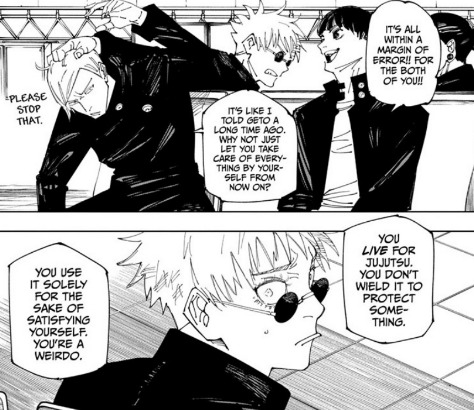
GREAT TEACHER, GOJO
For my final commentary on chapter 236, I thought I'd talk about this panel the starter of a million flame wars on twitter dot com. The big controversy is Nanami stating that Gojo fought only for himself without mentioning his students which a lot of people thought was a last minute reversal on Gojo's character, or character regression.
I'm not going to call anyone stupid, or say if you have good teacher Gojo headcanons you're wrong. However, I'd like to point out that Gojo's always been more complicated than most shonen mentors. He's not Kakashi, and he's not Aizawa, and I'd argue the fact that he's not the standard "I'd die to protect my students" mentor we see in shonen manga is what makes him interesting.
The Springtime of Youth
Jujutsu Kaisen is a shonen jump manga that is very aware of the other manga that are running in the same magazine and uses that awareness to play with audience expectations.
To put it simply if you don't want to use words like Deconstruction - if you're reading Jujutsu Kaisen then things are probably not going to go the way you expect them. It's not Naruto, it's not My Hero Academia, it's a little bit like Bleach except characters actually die.
If you expect things to go one way in Jujutsu Kaisen, then you're going to be thrown a curveball. To name some examples briefly before diving into Gojo.
Yuji Itadori is a normal boy protagonist suddenly dragged into the world of the supernatural.
However, everything goes wrong from there. Jujutsu Sorcerers are not heroes. Yuji is told that much from the beginning by Megumi within the first thirteen chapters. The world of Jujutsu Sorcery is not a good place to be, Yuji is initially excited to be a sorcerer and to be a part of this world and then learns that lesson fast. I mean, imagine if Deku was accepted to UA, and then he immediately learned that students at the school die on the regular and all the adults are either terrible selfish people, or if they're not they die too like Nanami because being selfless means sticking your neck out for someone else.
Yuji's not really special in the narrative. He's just a kid who swallowed a finger. He doesn't have a secret technique. We're hundreds of chapters in and he's still just punching people. If he's cornered in a fight he doesn't unlock a secret technique either, he just loses.
Yuji has a superpowered evil side, like the nine tailed fox, or Hollow Ichigo except it's not really his super powered evil side. It's an evil parasite attached to his soul with a will of its ownt hat will manipualte him. Hollow Ichigo and the Kyuubi can escape temporarily and there's usually no consequence. Sukuna escapes twice, the first time he nearly kills Megumi, the second time he kills thousands.
Yuji is kind of like a main character who is not a main character.
If you still believe he's the main character, then you can agree he's punished for thinking he's the main character and therefore things are going to be easy, because nothing is ever easy in Jujutsu Kaisen.
Megumi is a riff on the chosen one. He's supposed to be the Gojo Satoru of his generation, born with the strongest technique that ca even surpass the limitless and he's nowhere near the level he's supposed to be. This is because Megumi has been continually failed by every adult figure all his life, starting with his father who sold him, then Gojo the man who SAVED* him techically but with a big asterisk that he needed to become his student and do jobs for Jujutsu High School otherwise Gojo would just let the Zen'in take him or let them starve I guess. Megumi has no adult figures to rely on, and has been given very little freedom about who or what he wants to be in his life, and therefore he's a very passive, repressed individual who's riddled with insecurities. Megumi doesn't want to be the strongest like Gojo, or like many hero / rival characters in shonen manga. Megumi doesn't even know what he wants to be, because he's never been given any choice in life.
If you don't think Megumi's a deconstruction of any sort of character type, look at those posts on twitter that are like "Look at the black haired depressed shonen boys" and then look at Megumi, he's never actually like any of these boys because he's much deeper and probably closer to being the main character than Yuji is.
Then we get to Gojo who is very unlike all the other mentors in shonen manga.
If Yuji and Megumi are both riffs on a main character, a hero in a world so cynical he's not allowed to play hero and actively punished for it, and a chosen one who doesn't want to be the chosen one then you have Gojo as the mentor who's nothing like the classic mentor.
The problem with mentor characters in fiction is that number one they die a lot (spoiler warning Obi Wan Kenobi dies in Star Wars just so you know) and number two they're not usually the most complex character in the cast.
What is the mentor there for?
To Mentor (duh.)
What this means is they are usually a fully formed adult who can teach a lesson to the main character, who in shonen manga is typically a teenager.
I say they're usually less interesting because stories are about characters changing, or characters learning lessons. A teacher presumably already has learned his lesson. They are usually at the end of their journey and not the beginning, that's why they can offer wisdom to the main characters. They're not usually their own separate characters because of this - a narrative doesn't have time to waste on a character that's not going to change.
Jung had a term for this character, it's called the Wise Old Man.
In Jungian analytical psychology, senex is the specific term used in association with this archetype. Examples of the senex archetype in a positive form include the wise old man or wizard. In the individuation process, the archetype of the Wise old man was late to emerge, and seen as an indication of the Self. 'If an individual has wrestled seriously enough and long enough with the anima (or animus) problem...the unconscious again changes its dominant character and appears in a new symbolic form...as a masculine initiator and guardian, a wise old man, a spirit of nature, and so forth'.
The role of the wise man archetype is to help other people along with their ego development, because usually they are already fully developed individuals.
Obi Wan is the most typical of typical mentors, and he dies in Star Wars because after he finishes teaching Luke he has nothing to do. This is Luke's Hero's Journey. Obi Wan's already happened offscreen, he's at the end of his journey there's no room for change or growth in him because his story purpose is to exist to advise Luke and to do that he needs to be a fully grown adult figure.
The subversion to this when the mentor has their own agenda (Gandalf), or the mentor is as flawed as the main characters themselves and so therefore he has something to learn.
Gojo is kind of a combination of both, like Gandalf he is the mysterious but seemingly all powerful wizard (er... or rather sorcerer) with his own agenda, and he's also practically the fourth member of the main cast who are otherwise all teenagers. In fact, Gojo spells out his agenda in the same panels that everyone uses to constantly assert that Gojo is a good teacher who only wants to protect his students.
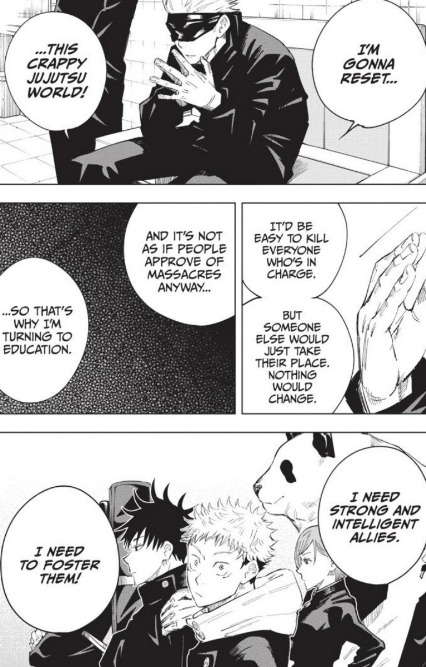
He wants to make the Jujutsu World a better place (good) which is why he is raising students so he can turn them into his political allies to make a regime change (hidden agenda).
It's a means justifies the end type scenario. In Gojo's mind the means (raising kids as tools in support of his political agenda) justifies the ends (a better jujutsu world for those children). His motivation is still the same. This is what I think people most often get confused about with Gojo's character. I think he is one hundred percent genuine about wanting a better world.

"I have a dream, I want to reset this crappy Jujutsu World" is his motivation, but not his means. He uses his students as a means to achieve that end. Even if it's purportedly for their sake, he's still using them. I don't even think this is subtext it's text, both Megumi and Yuji call themselves cogs.
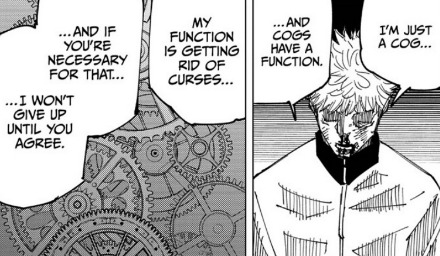
"But senpai, what's your function...?"
You could say in this case that the ends don't justify the means. Is Gojo really protecting these kid's youth, if Yuji and Megumi are going around calling themselves cog and acting like they don't matter in the grand scheme of things? In fact the narrative is inviting you to question if Gojo's ends justify his means.
Gojo's ideals can be one hundred percent real, but he can also pick faulty ways of choosing those ideals that fail to live up to them. In fact most people fall short of ideals, that's why they're called ideals. Gojo is taking these kids in because they have strong potential as sorcerers and he wants to recruit them, that's his hidden agenda. It's confirmed in databooks in Yuji and Yuta's case, and even if you don't trust databooks as canon then look at how he treats Megumi.
Megumi is explicitly Gojo's student, not his son. He only intervened in Megumi's situation on the caveat that Megumi work for him. Presumably, if Megumi didn't want to be a sorcerer and just wanted to be a normal kid, Gojo would have either let the Zen'in have him or do nothing. The option of just calling child services and getting someone to foster Megumi until he was older didn't even seem to cross Gojo's mind. There's the help he gives (Food money, rent, protection from the Zen'in) and then the hidden agenda (Don't work for the Zen'in who are my political rivals, you're my student now).
Yet at the same time Gojo is shown going to find Megumi after Geto's defection, probably because of the words he said to Yaga "You can only save those who want to be saved," when he realized it was too late for Geto. Was he intervening earlier for Megumi because he learned from being too late with Geto? Did he think Megumi needed guidance, or did he think Megumi needed protection in his youth so the Jujutsu World wouldn't corrupt him like it did Geto, or did he think he just needed to make it so Megumi was strong so he wouldn't fall behind him because Geto fell so far behind him once Gojo became the strongest. There's ambiguity there, because the hidden agenda is you know... Hidden. That's what I mean with Gojo though, you can look at him from multiple angles, he's not just (I love my students I'd die for them) because that character would only have one purpose in the narrative and that'd be being the perfect mentor who teaches them all the right lessons.
Gojo's not like other mentors, and in fact he's a commentary on the mentors that everyone is always comparing him to and expecting him to be like.
Literally everyone who reads Naruto has the exact same response, "I hate how the manga never talks about how it's a bad thing to send these child soldiers into war, and nobody breaks the cycle."
There are a lot of people unhappy about the same thing in My Hero Academia, "Why does nobody talk about how wrong it is that the adults make these high school students fight on the battlefield."
Well there you go. That's Gojo. His dream is to make it so Jujutsu Society is a place where teenagers can survive until adulthood. His method of doing so is to... raise those teenagers to be stronger than the previous generation, but you know still letting them be child soldiers on the battlefield just stronger ones. He does this because if he's working within the system the his two choices are raise a group of people who can age out and replace the old regime, or just kill everyone at the top.
Everyone complains about how no one talks about the child soldiers in Naruto or My Hero Academia, but here you go, we have a manga that is centered around how messed up it is to send high school students to continually fight these curses before they even turn eighteen. Gojo's sending these kids out there still even if he wants to change things, and it's supposed to be a little messed up and also a contradiction to what his ideals are supposed to be.
Because in My Hero Academia you have characters like Aizawa and Kakashi who are "I will die for my students" but then they just send those teens out to fight in a war, and seem totally fine with that. It's a hole in the writing, but this time it's done on purpose, to ask why these adults are always comfortable sending teenagers out to fight for them?
Jujutsu Kaisen provides two answers, number one the system is inherently corrupt and it sees the youth as cogs because the system is rooted in traditions that keep the elderly in power. Number two, in Gojo's case at least this is exactly what it was like for him growing up as a child. Gojo is just repeating with his students what was done to him, subconsciously.
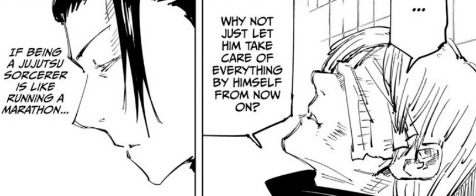
The reason Nanami said this, and then repeated it in this most recent chapter is Gojo was born to be a Jujutsu Sorcerer. Being a Jujutsu Sorcerer is a highly deadly occupation for everyone else, except for Gojo. Not only that but because he's so good at it, and he's so lauded for it he's built his entire identity around it. Nanami's not just saying that Gojo is selfish, he's also saying that Gojo thinks being a sorcerer is a good thing. It is the end all, be all of Gojo's existence.
He doesn't want to make it so sorcerers don't have to fight, or make it so all cursed energy is gone for the world like Yuki Tsukumo, his dream is actually kind of limited in scope he doesn't want the school days of his students to be destroyed by the outside world the way it was for him and Geto.
Gojo looks at the symptoms and not the cause. Geto defected, Haibara died, Yaga wasn't really able to do much for his students in both scenarios. Gojo deduced it was because the elders and regressive policies were holding people back in favor of keeping the regime in charge (correct) and that because of that the sorcerers in Gojo's high school years just weren't strong enough to keep up (this is just what Gojo thinks).
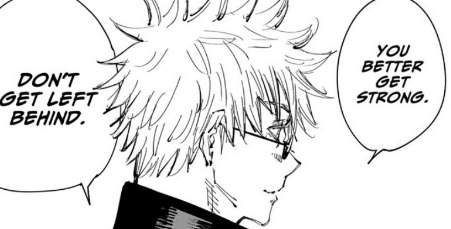
His words to Megumi are encouraging him to be strong so he won't get left behind, which as I speculated above might imply Gojo thinks that part of what went wrong with Geto was that he simply wasn't strong enough to keep up with Gojo or stay on his level. If not then he still encourages Megumi to get strong before everything else, he's not taking care of these kids emotional needs, he's pushing them to get stronger because in Gojo's mind that's the be all end all solution to every problem.
"Nanami's line was not saying that Gojo doesn't care about children, it's saying that "You live for Jujutsu." It is the lens through which Gojo sees everything, and so therefore he doesn't think of breaking kids out of the Jujutsu World, just making it a place that's slightly more safe for them. Gojo's ego is so strong that he only ever sees things from his point of view, being a sorcerer was fun for him, his high school days were the happiest time in his life before they got ruined by outside forces.
He's trying to protect those days for his children, but he's not arguing against the existence of an institution like Jujutsu High in the first place. He's not saying the teenagers should never be sent out on missions, he's saying we need to make the teens stronger. If they're stronger than they won't die (that's probably true but they'll be even safer if they don't have to go on missions in the first place).
Now we have a reason! Why do Aizawa and Kakashi send out child soldiers into the battlefield if their goal is to protect their students? Because it's a shonen manga and the main characters are all teenagers.
Why does Gojo send out teenagers to fight for him if he wants to protect them, well I just explained it.
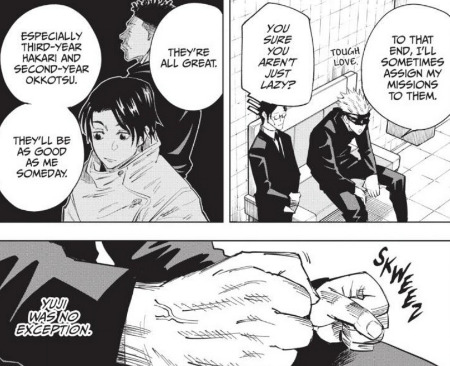
In fact, the entire purpose of Nanami in the story is to give us a character who explicitly treats children like they are children and not miniature adults. Who acknowledges that this is emotionally hard for children to deal with and they shouldn't have to do that.


Nanami's lines of "I'm an adult you're a child" and "Being a child is not a bad thing." would not have the weight they carry if they weren't so different from the way that every other adult in the story (including Gojo) treats children.
Nanami and Gojo have the same goal of making being a Jujutsu Sorcerer easier for children, but Nanami practices what he preaches. He tells Yuji to stand back and that he doesn't need to fight if he sees an enemy that's too strong, to let the adult on scene handle things first.
When he sees that Yuji is disturbed by the idea of killing former humans that Mahito had changed with his technique, he consoles him. He knows that Yuji is a sensitive kid and tries to spare him as much of that grief as possible. When he leaves Yuji behind he tells him explicitly that he's the adult in this situation, he shouldn't be forcing a child to help carry that burden if it's not necessary.
He also explicitly tells Yuji that being strong or jumping into life threatening situations =/= as growing up. Nanami is a character aware that the problem isn't that the children are not strong enough, but that too much responsibility is being thrown on these children. That there is a difference between what children and adults are emotionally capable of. Gojo doesn't see that difference because he reached enlightenment as seventeen. He even explicitly chose Nanami because Gojo knew he wasn't good at that stuff.
Nanami was not saying that Gojo doesn't care about children, Nanami was saying Gojo lives to be a sorcerer, Gojo who loves sorcery doesn't understand why being a sorcerer is too much of an emotional burden on a child. He just doesn't. He literally says his students are flowers.
Now, here's the kicker. Nanami dies.
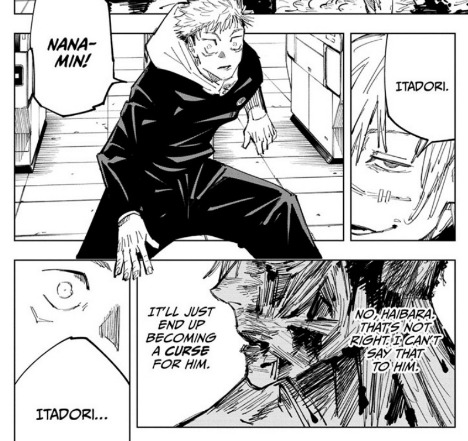

Nanami wanted Yuji to not take on too much responsibility, and he died leaving Yuji with more responsibility than he could ever carry. Nanami failed in his goal, despite the fact he is the most responsible and well-meaning adult in the story who treats children like they're children.
The reason he dies is because this is what happens to people like Nanami in Jujutsu Society. The whole of society is built to condition people into being cogs and Nanami who's just one person can't overcome it on his own. I can write a whole meta on how Nanami's way of dealing with children is way better than Gojo's and yet they do essentially the same thing, throw way too much responsibility onto Yuji even though he's just a kid. They're both too ingrained in the system to make any sweeping changes, and that's why the child soldiers keep on child soldiering.
Gojo as a Character
The second reason as eluded above that Gojo is not meant to be read as a perfect teacher, or even a good one really is because he's the fourth main character of the cast. If you are a main character, then you need a flaw, and an arc where you either improve upon that flaw or you succumb to it in tragic fashion.
Gojo's not the perfect adult mentor, because he's kind of in the same place as the kids themselves. I think there's a reason we never learn anything about Gojo's backstory, we know nothing about his parents, the Gojo clan, because those details aren't as relevant. The most important thing about Gojo is the three years he spent at high school, because that was the only time he felt like a person, and also because he is trapped there mentally.
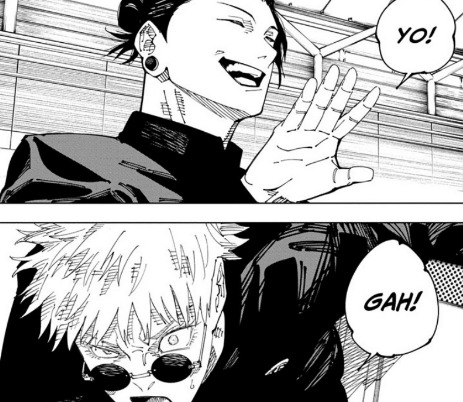
There's a reason that Gojo's dying dream is him imagining everyone reset to seventeen years old, because that was where the clock stopped for him in his youth, and that was where all of his regrets as an adult come from. His motivation to help teenagers today only comes from his own youth being ruined, and the adults in his life failing to protect him.
It's very likely that Gojo who lives for Jujutsu probably would never have realized the problems in his current society, if his youth wasn't ruined by those same adults he's now fighting against.
The reason most mentor figures in fiction are not main characters is because as adults they don't really need to grow up anymore. The obvious solution is that you just need your mentor character to just fail to be an adult in some glaring way.
To show how Gojo falls short as an adult, especially in regards to these children and how he treats them is to drag him down from all powerful, all knowing wizard, and make him struggle with the rest of the main cast. Gojo is not a positive adult figure in these kids lives despite having the best of intentions, because he's not really an adult.
I guess if you were already the best and strongest person in the world at seventeen, smarter and more capable than all the adults around you, you wouldn't really feel the need to grow up. Coupled with the fact that you are alienated from other people and do not relate to them on a personal level that's not going to help with your identity formation.
I mean I constantly compare Gojo to Superman, but to be fair to Gojo instead of bullying him like I usually do Clark Kent was raised by parents who raised a boy not a superman, and who constantly tell him that he's just a normal person, his powers don't make him great, it's his heart.
Nanami says that Gojo only fights for himself that ""You don't wield Jujutsu to protect something, you use it solely to for your own sake. What a weirdo" it's likely Gojo only fights for himself because he's never ben told that's he's more than just the six-eyes and more than just the limitless.
The best way to make a mentor a part of the cast, is to make them through some way or another have failed to grow up properly in their youth and therefore they need to do it while the story is taking place. We know how Gojo failed, his springtime of youth ended early, it ended the day he couldn't stop Geto from leaving, the day he can be the strongest sorcerer ever and still fail because sorcerer society is too corrupt for one person to handle alone. We also know he didn't really grow up past this point, because he still thinks the solution is to make people be stronger. Why does he not do anything about Geto for 11 years? In story terms he's basically suspended in time unable to grow past Geto. Kenjaku literally uses the trauma from his youth and the memories that seeing Geto alive would provoke in Gojo again, to trap him because he knew it would make him freeze up. Gojo is frozen in the past, he failed to grow up in story terms and must now grow up while the main story itself is taking place along with the children he's trying to raise.
This is how you make a mentor interesting. You have to make them flawed in some way that makes it worth having them onscreen, because a perfect mentor only serves one purpose to teach a main character and then he's gone.
Dazai Osamu from Bungo Stray Dogs is a character that's almost as massively popular as Gojo. Similiarly, he is a teenage genius who found trouble relating to other people who is now as an adult attempting to mentor two children.
However, Dazai's faults as a mentor are made much more explicit.
Dazai suddenly punched Akutagawa in the face, preventing him from finishing his sentence. Akutagawa flew back onto the ground, his head bouncing off the stone flooring with a thud. "Perhaps I made it look like I wanted to hear excuses. Sorry for the misudnerstanding," Dazai said while rubbing his knuckles. "Urg..." Akutagawa moaned. He'd hit his head so hard that he couldn't even stagger to his feet. "Give me your gun," Dazai ordered one of his men. The subordinate was hesitant but nonetheless handed over his weapon. Next, Dazai removed the magaine from the automatic pistol, took out all but three bullets, then put the magazine back in. He immediately pointed the gun at Akutagawa, who was still on the ground. "I have this friend who's supporting several orphans all on his own, you see," he continued his weapon still drawn and aimed at the boy. "AKutagawa I'm sure Odasaku would've been patient enough to give you the guidance you needed had he been the one who'd found you on the brink of starvation right in the slums. That would have been the 'right' thing to do. But 'righteousness' doesn't take very kindly to me. And there's only one thing people like me do to useless subordinates." Dazai mercilessly pulled the trigger the moment he finished his sentence.
(Don't worry, Akutagawa lived). Dazai is a character who had a troublesome youth he never grew up from. He was too smart for the world as a kid, and because of that joined up with the mafia because he wanted to feel like he was more connected to life and other people by getting closer to death (weird dazai logic I know) and was the best of the best at it, but it only drove him further away from people. He makes one friend, and loses that friend similiar to Gojo. Just like Gojo too, that friend is the one who gives him his purpose as an adult that drives him to mentor young people.
"Odasaku.. What should I do?" "Be on the side that saves people," Odasaku replied, "If both sides are the same, then choose to become a good person. Save the weak, protect the orphaned. You might not see a great difference between right and wrong, but... saving others is something just a bit more wonderful."
Is this not what Nanami said just in different words. Odasaku tells Dazai point blank, I know you're selfish, I know that you don't really have any concept of good or evil but you can choose to save others anyway.
Isn't this what Gojo does?
He is selfish. He doesn't really consider the morality or his actions or get hung up on the idea of protecting the weak like Nanami or Geto do, but he still does go out of his way to live for the ideal of saving children.
Both Gojo and Dazai are characters who are struggling with this ideal of saving the children, because while their ideals are good they themselves as people are morally gray. Adding onto that, they're also children and a good deal of their backstory is devoted to showing why they never really grew out of the mindset that they held as children.
The story doesn't call them horrible monsters for it, it's just saying that they need to grow up or face the consequences of not growing up.
"I have one regret," I said. "I never got to say good-bye to my friend. He was always there for me as 'just a friend.' He was bored of this world and always waited for death to come for him." "That man was in search of a place to die just like me?" "No, not exactly," I answered. "I thought you were similiar to Dazai at first, rushing into battle and wishing for death without even considering the value of your own life. But he's different. He's sharp-witted with a mind like a steel trap. And he's just a child - a sobbing child abandoned in the darkness of a world far emptier of the world we're seeing." He was too smart for his own good. THat was why he was always alone. The reason why ANgo and I were able to be by his side was that we understood the solitude that surrounded him, and we never stepped inside it no matter how close we stood. But in that moment, I kind of regretted not stepping in and invading a little.
Does that sound like the narrative is condemning Dazai for being who he is? No, it's Dazai's best friend offering empathy and understanding for how lonely it must be, and how if Dazai made real connections with people then he could have a chance of growing up like everyone else. That's what the narrative challenges Dazai to do while empathizing with why it's harder for him to and why he's still trapped in his youth, because to take care of children you need to be an adult yourself. Otherwise if you're a child, and I'm a child, then nobody's driving the plane.
Rupert Giles from Buffy the Vampire Slayer is another mentor who faces the same moral dilemna that Gojo does. In fact his entire character revolves around the fact he knows deep down he's sending a kid to her early grave.
Buffy is the Chosen One TM. One girl in all the world is chosen to fight the vampires. Much like sorcerer society, there is an entire bureaucracy dedicated to identifying the chosen slayer and then raising her up and guiding her as a weapon to be used against the threat of vampires and demons.
The watchers are all adults. The slayer is a teenage girl. The slayer slays. The watchers watch. Just like in Jujutsu Kaisen, there is a necessity for the Slayer to exist, because the alternative is just letting vampires eat people. Yet even if the slayer needs to exist, at the end of the day a bunch of adult men are sending a teenage girl to fight for them.
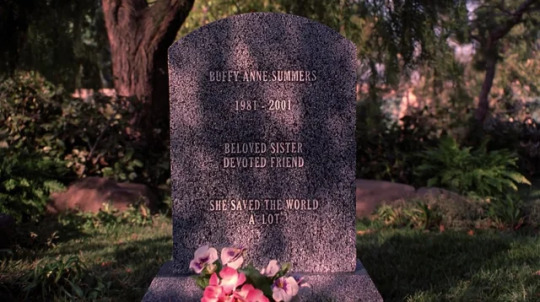
All Slayers die young. All of them without an exception. No matter how good of a mentor is, no matter how much he cares about her, Buffy is going to die one day, and Giles is going to watch. Because that's what the watcher does, they watch. Sending her on missions means Buffy's in danger, not sending her means innocent people are in danger.
It's a scenario that's pretty much like Gojo's, and the narrative of Buffy makes it explicit that Giles really can't be a father figure to bufy in this scenario. A father would have to choose to put their child above the world and keep them safe, not send them out straight into danger.
It is a choice that Giles makes over and over again. He is always her watcher and never her father. There's a season 3 episode where Giles literally drugs Buffy as a part of a test to prove she is "worthy" of being a slayer. A test that deliberately puts her in harms way that he complies with - because the system told him to. A choice to be her watcher and act according to what the council of watchers wanted and not what Buffy wanted. A choice that shatters the illusion that Buffy had of him, showing her that Giles is only there to teach her to be a Slayer, not to take her to the iceapades or buy ice cream with her.
In this scenario Gojo is very much like Giles as no matter how much he may personally like these kids, he is not their father, and there is only so much he can do for them when he's still feeding them into the same system. Giles loves Buffy, Giles wants to protect Buffy, Giles is a part of the system that exploits Buffy. Giles is an adult asking Buffy to risk her life to save the world.
Gojo goes out of his way to recruit Megumi, Yuji, and Yuta among others. Gojo still doesn't let them be anything other than sorcerers, and as sorcerers they're still guaranteed to one day die and probably die young. Gojo wants to revolutionize the system he is, but he still sends out his students to do missions as part of that system. He's not letting them escape it, he's just making them be stronger sorcerers.
Not only is Gojo not a father figure to Megumi, he is exploiting him more or less. The option of Megumi not being a sorcerer isn't on the table. No matter how well-intentioned he may be, or how good his ideals are he's still an adult telling a child to make a sacrifice for the world.
So, there are two character conflicts with two different mentors that both reflect Gojo. Gojo cannot grow up because he's still trapped in the tragedy of his youth. He himself is not an adult, for various reasons (lack of connection to other people, trauma in his youth) he's egocentric like a child but there are children in his life who need him to be.
Gojo also cannot be a proper adult, because he is part of a system that exploits children. We see what the system does to proper adults like Nanami, he shows us just how much well-intentioned adults struggle to help kids under sorcerer society so how about Gojo who thinks being a sorcerer is really fun. A proper adult would never send kids on those missions, they'd find some way to shield them but Gojo cannot do that. Because sorcerers are short staffed and innocent people will die if he doesn't. Because Gojo isn't the sorcer-king of Jujtusu Society and is working within it to affect change. There are reasons, but still Gojo is failing to live up to his desire to protect children because he's not doing what a responsible adult should do in this situation.
Gojo's failures are two-fold, and yet it's because of those failures that he was a main character who got as much special plot attention as he did. If Gojo was a perfect teacher he wouldn't be a character. After all, we relate to the struggles of other human beings we see onscreen in television and in movies so why would we care about a perfect character?
Gojo has a lot more to say about teachers in shonen manga, and also about childhood vs. adulthood as a bad teacher struggling to be a good one, then a teacher who's already perfect. Nanami said those lines because he wanted us to understand the audience that this is who Gojo is, he is a selfish and egotistical person who nonetheless was trying to do good things.
733 notes
·
View notes
Text
I still can't get over stsg's introduction as a concept. gojo was built up to be isolatingly powerful, a league of his own: childish, annoying to all those close to him, hard to stand but respectable (aka nanami and utahime), a slippery guiding mentor, unruly and untamable, a whole force of his own and solely his own (the confidence, the disobedience to elders, the reputation, the fear and awe around him)---all introduced through yuuji's non-judgemental and curious lens. I think someone pointed ages ago out how- the closer someone is to gojo, the more tired they look inside. and that's why when they actually introduce the fact gojo had an actual, real friend- a best friend- you start to think, what? what kind of person would suit and match satoru gojo? who is this? who would make gojo feel equal? and it's somehow??? this obnoxiously moral guy?? filled with a kick of anger and buckets of tormented righteousness, and a witty (later turned bitter) benevolent streak. and you watch gojo watching him, always standing by him, watch him fit into place there like he couldn't see anything else. watch the in-sync laughter, the back-and-forth banter, watch them just be teenagers admist it - someway and somehow - same childish attitude, but younger, impressionable, and its like gojo's storing all his experiences with geto away in his mind. the discussions of who to protect-? gojo lives it out. the pain of geto's fall-? gojo carries it for the rest of his life, an aching open wound. it almost hurts that gojo's childish antics aren't complimented by geto's indulgent, light-hearted admonishing anymore. something you didn't realise was missing the whole time until now??? didn't realise "after all, I'm the strongest" used to be been "after all, we're the strongest". and in getting to know geto, you puzzle through how he was gojo's 'one and only': a guy who's personality comes off a bit controlling, a bit forceful, way too philosophical, clinically considerate- and somehow this really was gojo's best friend. they clashed over all their differences all their time together and yet even that was so important to them both, and you come to know it couldn't have been anyone else. this is who helped make gojo who he is. this is who was missing from him at the start.
1K notes
·
View notes
Text
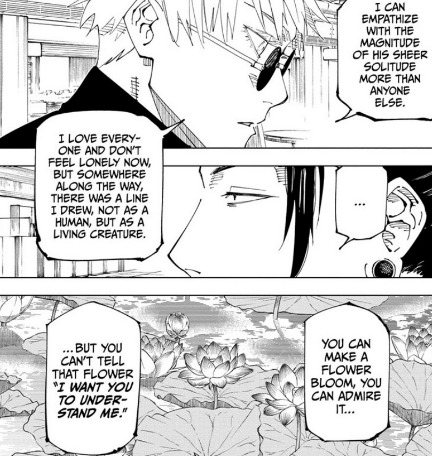
I WANT YOU TO UNDERSTAND ME
It's not surprising to me that Gojo's dying monologue he spent more time talking about his fight with Sukuna than any of his students. Gojo's priority from the beginning isn't to save Megumi but to fight all-out against a strong opponent, the line is: ""The Absolute Strong. The loneliness that follows. The one who will teach you about love is..."
This fight is basically the climax of Gojo's identity crisis which has been a long running issue for him throughout the manga. He's simultaneously a self-confident individualist with an overpowering sense of "ego" and a person with little idea of who he is outside of the role in society that was given to him. Gojo went into the fight looking for someone capable of understanding him, the fight is about Gojo seeking an answer to who he is, that's why he fights and that's why he loses.
Gojo is Not Normal
Nanami's statement is misinterpreted I think.
"You live for Jujutsu. You don't wield it to protect something. You use it solely for the sake of satisfying yourself."
A lot of people took this to mean that Goo didn't care about anyone but himself, even though Gojo directly contradicts this earlier.
"I love everyone and don't feel lonely snow, but somewhere along the way there was a line I drew, not as a human but as a living creature."
He states he does love other people, if only from afar, he just doesn't understand them. Gojo can't make other people his reason to fight, because he only understands himself. He only sees himself. He can only fight for what's inside himself.
"You can make a flower bloom, you can admire it, but you can't tell that flower 'I want you to understand me'
Gojo's students are the flowers. Itadori, Fushiguro and Nobara are all named after flowers. He's raising them up to be as strong as him, he's fond of them, but he doesn't think they relate to him because he exists in a different category of other people.
A lot of people want Gojo to be a more traditional caring mentor figure like Kakashi or Aizawa they're missing what's really interesting about his character. When Nanami says "Gojo only cares about being the strongest" it's true because his entire character is written around the statement "I am the strongest". He is conceptually about what it is like to be the strongest man in existence. That is the character concept, and Gojo's entire identity crisis revolves around that he's built up his personality around being the strongest at Jujutsu and nothing else.

Gojo can only fight for his own ego and self satisfaction as Nanami says, because he has nothing else, he has no identity outside of that.
However, before I get into why I want to point out that Gojo is not normal. It's not because someone on his power level is fundamentally incapable of relating to other people, but Gojo himself...is not right in the head. He's making an active decision to choose not to empathize with people whatsoever, it's not just that it's hard to understand him, it's that they can't understand him.
Gojo talks about his students like they're members of another species. They're flowers. They can't relate to him on a human level because he's something other than human. A friend had an interesting reading on why specifically it's flowers Gojo chose for his metaphor.

Plants are less sentient than insects, they don't contemplate anything they are just taken care of by their gardener and grow towards the sun. That's how differently he sees himself from others.
I wanted to include this take from @kaibutsushidousha as well.

Gojo's not from the planet mars he's a human who has human emotions and human psychology like everyone else, so that's simply not true, but Gojo believes it is and that belief influences how he interacts with everyone.
Gojo can't see himself reflected back in other people for some reasons that aren't his fault and some reasons that are. Gojo has been from birth, treated as different from everyone around him, not for anything he really did but because he was born with a really strong jujutsu ability. He's a literal chosen one. He always seen as the six eyes user, the strongest, before he was seen as a person. His entire life has been defined entirely by the abilities he was born with, he was born to be a Jujutsu Sorcerer so of course that's what he builds his entire identity around.
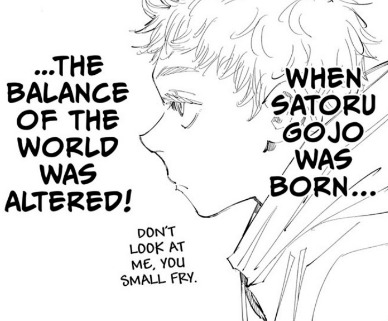
Not only is he told that he's categorically different from others, but he also believes it. We know little about his early childhood besides Gege's statements that he was spoiled, but we do see later on in childhood there are people who are willing to treat Gojo normally despite the position he has as the strongest. This is when it starts being Gojo's fault that he continues to see himself as different from other people.
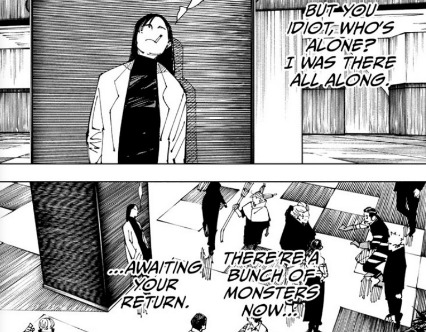
Shoko, Gojo's closest confidante in his schooldays after Geto's days basically tells him that. She's been with him for years and yet he still has the audacity to act like he's all alone in the world. Even when people try to treat Gojo normally and relate to him on a personal level, Gojo actively ignores their presence in his life like he did Shoko because he's not only been told he's different from other people because he's stronger, but he believes it and he's built his entire world view around it.
This is why the only person that Gojo ever let in was Geto, because Gojo believed that Geto was someone who could stand on top with others. THe only person who could believe the strongest, or teach them about love was someone equally as strong. Gojo just happening to meet another sorcerer who was special class as a teenager not only allowed him to have a friend, but fit perfectly into his narrative that he was separate from others and only someone as strong as him could understand. There are people like Shoko and Nanami who treat Gojo normally despite the fact he's the strongest, but Geto was the only one Gojo met in because he met the qualifiaction of being someone equally as strong.
This isn't really the case for Geto. Geto comes to see weak people as inferior yes in the sense he sees Non-Jujutsu Sorcerers as inferior, but Geto is capable of making connections to other Jujutsu Sorcerer. Geto has his family, he has Nanako and Mimiko and the rest of his followers who he all cares about equally. Geto met all of them and chose to relate to them, he even tells Gojo after killing his biological parents that he's choosing who his real family is now.
"It wouldn't be fair if I made an exception for my parents, now would it? Besides my family now consists of more than just them."
Geto demonstrates someone as powerful as Geto can make a choice to relate to other people. It's shown in the way that Geto treats Nanako and Mimiko, he is their father and he raised them as his daughters. Compared to how Megumi is just a student to Gojo. Gojo's only invested in making Megumi into a strong Jujutsu Sorcerer, because Gojo doesn't fathom connecting to someone weaker than him. He's only their to raise up a strong sorcerer, whereas Geto who's capable of connecting with people in other ways is raising up Nanako and Mimiko and they're connected as parent and child.
Geto and Gojo are similiar in a lot of ways, same level of strength comapred to the rest of humanity, same god complex (and yes it is a god coplex, there's a reason the two people Gojo relates to are Geto who has constant religious imagery associated with him and Sukuna who's literally satan) and yet Geto shows someone roughly Gojo's power level can make connections to others Gojo just chooses not to.
This is where I'm stealing from a friend's post a bit. @theanimepsychologist points out that Geto notices the beginnings of Gojo's identity complex soon after it started with Toji.
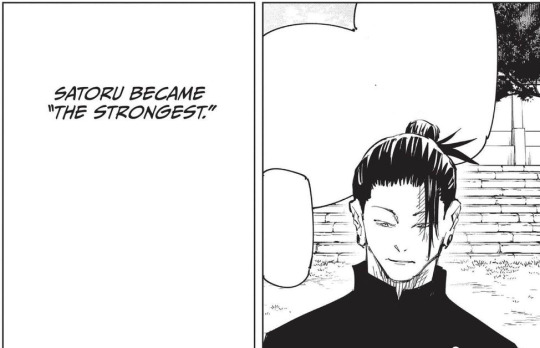
I always thought of the panel above as Geto being jealous of Gojo surpassing him in strength but, in retrospect, I think Geto’s disappointment had more to do with Gojo’s sense of self over-identifying with the title “the strongest” and how that made him harder to relate to, which is one of the main themes in this chapter. I’ll come back to this in a sec. But first… Quick depth psych segway. I think I’ve said this before, but it bears repeating again that an overwhelming sense of self is all ego. There’s nothing wrong with ego per se. The problem is that an over-identification with ego means inherent separateness because, as an organ of the psyche, the ego sense of self is what gives us a separate identity from the collective.
Geto notices that Gojo is drawing a line between himself and other people, and pulling away because of that because people in the second category of weak can't possibly understand the strong and he's reacting to it. Geto is also the only person to underline to Gojo himself that he's unsure about his own identity.

Gojo knows he's the strongest, but he doesn't know anything about himself besides that, or even what being the strongest entails in his relation to other people. He's never constructed an identity outside of it in part because he's never had to, nobody has ever challenged him for his title as the strongest, and he also fits jujutsu society's mould perfectly. He's perfect at what he does, why would he need to change? Why would a person who reached enlightenment at seventeen need to reflect upon himself or figure out who he is? You can't really become more enlightened.
The other reason he's never constructed an identity is he's never interacted with anyone on equal terms. Metaphorically Gojo exists in a vacuum of human interaction. How appropriate is it in a way that he was sealed in a box where time didn't move completely alone for who knows how long, because that's kind of just how Gojo sees himself in relation to the rest of the world.
As Psycho points out an unregulated ego results in an inherent separateness from the collective. People don't exist in a vacuum however. We wouldn't know who we are if we were entirely alone. We are defined just as much as ourselves, as we are by our interaction with others.
Ich and Du, translated as I and Thou is a book by philosopher Martin Buber. His two main porositions is that we may address existence in two ways:
The attitude of the "I" towards "it" towards an object that is separate in itself, which we either use or experience.
The attitude of "I" towards "Thou" in a relationship in which the other is not separated by discrete bounds.
I -> It is the world of sensations. If I am looking at a chair, I say "This is a chair. This chair is an eyesore." I am seeing the chair. I don't relate to the chair.
I -> Thou can be used to refer to a relationship between human beings. You don't experience the human being., you can only relate to them and what that relationship means to you. He goes on further to say that love requires a subject -> subject relationship. To love someone means you have to relate to them as if they are another being, you can't love an object.
He's a philosopher to put forward that it's human's connections with each other and their ability to relate to each other that brings meaning to life. Gojo in Buber's terms is only experiencing the world around him, not relating to it. How appropriate of someone with the six-eyes, an ability that gives him sight far better than anyone else to see himself as only an observer to the outside world, like a floating pair of eyes.
The choice that Gojo makes not to relate to other human beings on an equal level, not only isolates him, it affects his sense of self. People cannot exist within a background. Gojo's like a vampire who can't see his own reflection. ? It's all because of this caveat that Gojo himself has set up that no one can possibly relate to him unless they were equally as powerful as him that he can't see himself in others. He can't see himself in others, he can't find anyone to help him understand himself, and therefore his identity crisis goes unresolved.
Twitter user @ det_critics pointed this out that the question: "Take away his strength and what is he?" isn't one Gojo has an answer for, and one he's actively been running from.

As I said Gojo literally doesn't have a reflection, we see that in story when the prison realm opens its eye and it's just a void where Gojo's face is supposed to be. Gojo choosing not to think of himself as the strongest is also a choice not to think about who he'd be if he wasn't. A question he evades over and over again by telling himself that he can't be understood by people who are weak b/c he categorically exists on a different plane of reality.
When he does look for an answer it's telling just how not normal Gojo is in who he chooses to empathize with: which is Sukuna.
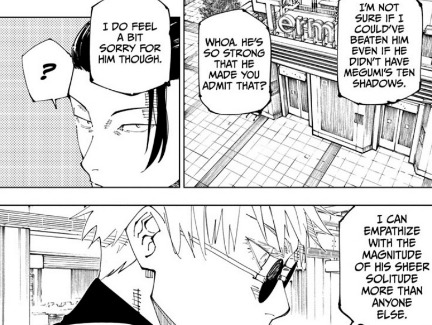
This is who Gojo as chosen to be the only other person besides Gojo he felt he could relate to. The same person who monologues about weak people like this.


The same person who monologues that weak people shouldn't even be alive, they should be culled. Sukuna sees weak people as insects. Gojo sees them as plants.
The first person that Gojo relates to as a subject rather than an object Geto is cut short, the next person he relates to as a subject is Sukuna of all people. He chooses to see himself in Sukuna, because Sukuna validates that incorrect idea Gojo has that someone as powerful as him could never possibly be understood by other people. After all, Sukuna the strongest sorcerer of all time isn't even really human anymore, he's a curse a calamity. For Gojo who doesn't see himself as relatable to other human beings this is validation of that mistaken notion.
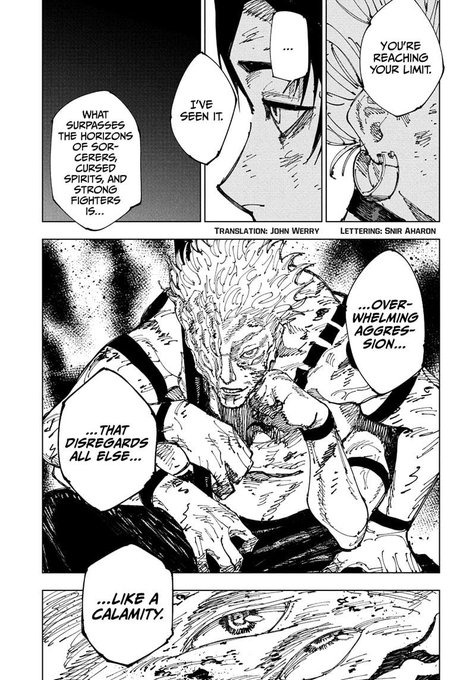
It's also telling of how much Gojo's own identity issues have warped him that he finds a curse personally relatable, and even pitiable because it's lonely. Sukuna, who's main problem is that he's bored because a life of killing people is unfulfilling and it's turned him into an adrenline junkie. This is who Gojo's personally chosen to relate to because they both only see the world in the category of "the strong" and "the weak."
Gojo's viewpoint of other people is mistaken for several reasons, but one interesting one was pointed out for me by Psycho. He refers to his students as flowers, but they're lotus flowers. Lotus flowers mean many things, but they're seen as symbols of purity because they rise up from the mud. Gojo is only looking at the flowers, not the mud they rise from .
"No mud, no lotus. The mud is what makes us who we are, and no one can 100% understand what wading through the mud feels like. I think people see oh shiny lotus, the outcome of wading through the mud but they overlook the self because we live in an outcome oriented society.
Gojo is someone who doesn't see the mud and therefore doesn't relate to the personal struggles of others. Which sabotages a lot of his personal relationships. Which like, to bring Megumi into this, Megumi is proof that Gojo IS NOT NORMAL.
Megumi is the kind of special genius that Gojo is, he's born with the strongest technique one capable of killing Gojo, but he doesn't become a special class at seventeen like Gojo, nor is he interested in doing that because Megumi is an entirely different person with differnt personal struggles than Gojo. He has all the raw potenital that Gojo does, but they have wildly different upbringings. Gojo was primed for success by being the spoiled child of his clan, while Megumi is an abandoned child. It proves again Gojo's maxim of people who have that much power are inhuman and don't follow human psychology is wrong because Megumi has all the potential to be as strong as Gojo, but he's just a normal kid. Megumi is still wading through the mud and Gojo doesn't see that.
GOJO IS NORMAL
Jujutsu Kaisen seems to be following Buber's logic on how identity is defined by the interactions we have with other people, because there was a period in Gojo's life where he did create an identity outside of being a sorcerer and that's when he was Geto's friend.

In the afterlife we even see him regressing to that previous state of being. There was a period for three years in his life that Gojo was something besides being the strongest, and that was when he was Geto's friend too. If Jujutsu Kaisen is about how identity and meaning are both constructed from the interactions we have with other people (subject -> subject) interactions then it's telling that Gojo reverts to his seventeen year old self because that was the first and only time in his life he was capable of relating to another person, and acted like a fully developed person outside of the role of sorcerer he was born to play.
If identities are constructed though that means they're not inherent. Gojo is not inherently the strongest, just as he's not inherently different from other people. This is different from what Gojo's been told his entire life. He was born the strongest. It's inherent to his identity, a fundamental part of who he is. Therefore people who are strong are inherently different from those who are weak, it's something internally different about them which makes it impossible for Gojo to comprehend the motivations of weak people.
Rather than just strong and weak being constructed categories. Gojo's the strongest at Jujutsu but if you took him outside of Jujutsu and asked him to work any other job he'd no longer be the strongest. He's only the strongest as long as he remains in his fish bowl that is Jujutsu Society. However, Gojo believes differently, he believes being the strongest is what he is, it's something inside of him, and something that makes him fundamentally different from others. This is the line that Gojo has been told due to being born with the six-eyes and this is what Gojo has bought.
This is also what his ability the limitless symbolizes, no one in this world can touch him or reach him, he exists somewhere else. However, the limitless can be breached and Gojo has been shown before there are others capable of touching him.


Toji is the first and only living human being to challenge him, until Sukuna comes along. However, Toji does arguably more in story than just give Gojo a good fight. Toji full on traumatized him, soemthing which Gojo refuses to acknowledge. Toji is the beginning of the end of Geto's friendship, the death of Amanai Riko sends Geto on a spiral for an entire years, and drives a wedge between Geto and Gojo's friendship when Geto self isolates and Gojo doesn't know what's wrong with his friend.
Gojo also experiences what it's like to be defeated for the first time in his life, and his response is to perfect the limitless so he runs it constantly all the time. Remember, before that he was exhausting it doing it for three days in a row, and when Geto told him to take a break Gojo reassured him he wasn't worried because he knew Geto had his back. Gojo was someone who could let down the limitless before that, but afterwards Gojo always insists on fighting alone with his shields up all the time. All to deny that feeling of vulnerability that Toji inflicted on him for the first time in his life, something he remembers years later, you know like trauma.
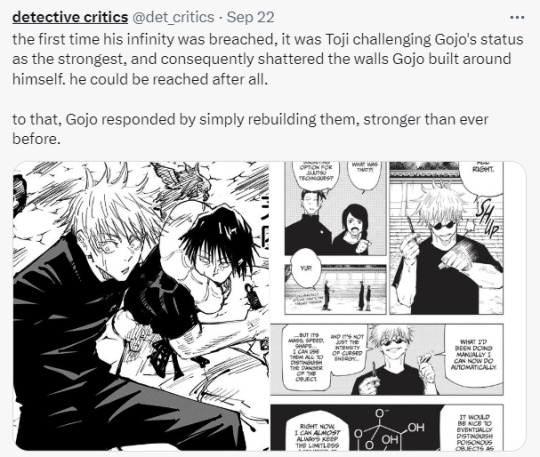
There are times when Gojo is reminded that it's possible he's the same as anyone else, he can experience human weakness. Geto's fall is another time, one post says it's particularly challenging for Gojo to comprehend why Geto would defect because he saw Gojo and himself as above others and therefore immune to human weakness.
gojou 100% has a god complex and thats why getous downfall hit him harder than anyone else. he saw himself and getou as above everyone else and exempt from ‘regular’ peoples flaws, he never thought either of them could be led astray and when getou finally snaps hes bewildered that something like that could ever happen to either of them. hes not just heartbroken over his best friend becoming an enemy, hes thrown for a loop because getou, the one person he thinks of as just as above everyone else and incapable of failing as he is, could ever do something wrong, could ever be wrong. hes finally put into a position where he has to face the fact that hes just as capable of screwing up as anyone else and he can’t make sense of it. gojous hesitance in killing getou isn’t just a byproduct of their friendship, it’s also him realizing that it could have easily been him on the other side of the conflict, which breaks the illusion of him being better than everyone for a second. and like that’s still not enough for him to reject this idea, personally i think that his comment about him and getou being 'the strongest’ in volume 0 is indicative of the fact that despite everything he still hasn’t grown out of this delusion.
Gojo has trauma, because he's a human being with human psychology. He makes mistakes, he has terrible past regrets like his friendship with Geto gone wrong, but he doesn't acknowledge those things because as stated above Gojo thinks he's immune to having regular people flaws. Gojo seeing himself in another category from regular human beings also allows himself to deny an vulnerability, because the strongest isn't supposed to have weaknesses. Seeing yourself as too distant to ever be touched by others also means they can never hurt you, emotionally or otherwise, an extreme form of the hedgehog's dilemna which is explored an Neon Gengesis Evangelion, an existentialist piece Gege takes obvious inspiration from.
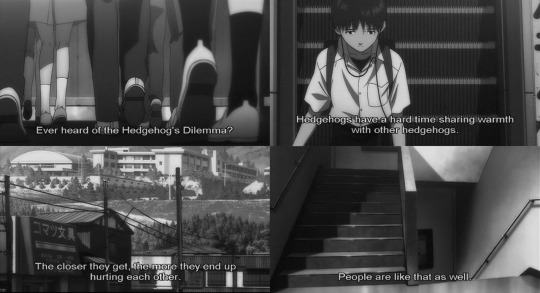
The fact that he avoids other human beings, not because he's fundamentally incapable of understanding them but because he's distancing himself from human feelings like loss, pain, suffering these weaknesses that are part of the human experience just proves he's the same as everyone else. If he wasn't capable of feeling those things he wouldn't avoid it, he wouldn't spend ten years mourning Suguru but not killing him directly until he was forced to on December 24th, he wouldn't be trapped by the box because seeing Geto alive made him have a three minute long trauma flashback.
Gojo is a normal human, with normal human emotions and human psychology, albeit twisted from the power he was born with and his unique viewpoint of the world but he doesn't believe that he is. He uses that as an excuse not to interact with others and because of this his identity suffers. Gojo is someone defined by how limited he is in the story despite having limited power.
Gojo fails as much in the story as he succeeds. As my friend @justapanda put it.
"But, it loos like being strong isn't enough..." Another point could also be made here that, regardless of being the strongest at this point, Gojo was incapable of stopping his closest friend from straying down a dark path, which is perhaps Gojo’s greatest failing in the series. This failure also comes back to bite him much later on as Kenjaku’s ace in the hole to finally checkmate Gojo involved surprising him with the now possessed body of Geto, which distracted Gojo long enough for him to be successfully sealed by the prison realm. Once again, the vast amount of power that Gojo had attained turned out to be completely useless in preventing his own sealing, which has now placed him in an inactive role for over half of Jujutsu Kaisen’s duration. Earlier in the story, Gojo once said: “Ironic, isn’t it? Given everything, but unable to do anything.” when referring to the function of his own domain. This was another intentional use of foreshadowing to describe the dilemma that Gojo was inevitably going to face himself. Satoru Gojo is no limitless man, for no one man is without his limits." Another point could also be made here that, regardless of being the strongest at this point, Gojo was incapable of stopping his closest friend from straying down a dark path, which is perhaps Gojo’s greatest failing in the series. This failure also comes back to bite him much later on as Kenjaku’s ace in the hole to finally checkmate Gojo involved surprising him with the now possessed body of Geto, which distracted Gojo long enough for him to be successfully sealed by the prison realm. Once again, the vast amount of power that Gojo had attained turned out to be completely useless in preventing his own sealing, which has now placed him in an inactive role for over half of Jujutsu Kaisen’s duration. Earlier in the story, Gojo once said: “Ironic, isn’t it? Given everything, but unable to do anything.” when referring to the function of his own domain. This was another intentional use of foreshadowing to describe the dilemma that Gojo was inevitably going to face himself. Satoru Gojo is no limitless man, for no one man is without his limits.
Gojo has moments where he brushes up against the idea that he's not capable of doing everything, that he has faults and fails like every other human being. However, that feeling never really lasts for long. He always tends to double down on his belief that he's the strongest rather than facing his faults because that's where he's comfortable. Gojo can't see himself reflected in other people and therefore is not capable of reflecting and critically evaluating his faults. Not only that but avoiding looking too critically at those losses, he also stops himself from feeling the pain of those losses and denies that vulnerability.
Gojo exists on another plane from other human beings, and therefore why would he experience human sadness and pain? All he feels is a vague sense of loneliness and unfulfillment because he's been so alienated from his own emotions and in Gojo's mind that's better than struggling with weakness. Who would deliberately choose to be just like everyone else when you can be special? Why get close to others when the hedgehog's spines are just going to stab you? However, people form connections because of their weaknesses. Humans cooperate with each other because they are a social species. All of society exists because people divide labor and help each other out. Even Gojo can't say there's no point in his life where he was weak, because he was cared for as a child and raised in a family. He didn't come out of the womb a fully formed individual. The darwinian survival of the fittest, and the black and white strong vs. weak way that Gojo sees the world just doesn't exist, especially in modern society. There's nothing wrong with individualism, but the extreme end of individualism is wrong because no one exists in this world alone you share it with everyone else.
Gojo doesn't even see that though, because he's not living in the same world as everyone else. In his mind the limitless makes it so he basically exists on another plane of reality, but again the limitless can be breached.

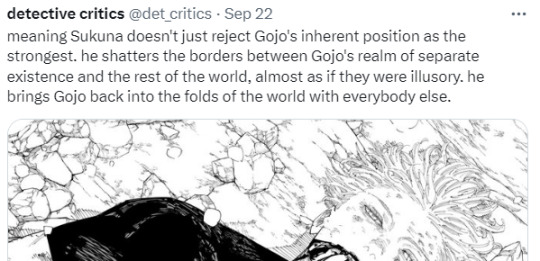
Detective critics basically said that Gojo's delusion was always a false one, he always existed in the same world as everyone else, he simply deluded himself into believing otherwise. There are reasons for this, his upbringing, trauma and not wanting to face the pain of that trauma, but it's still a choice he made. Gojo didn't want to live for other people, he didn't want to relate for them, so he lived for himself pursuing his own strength. Ironically, it reflects Toji's own decision to take pride in neither himself or others and live only for the sake of showing that the Jujutsu World that rejected him was wrong.

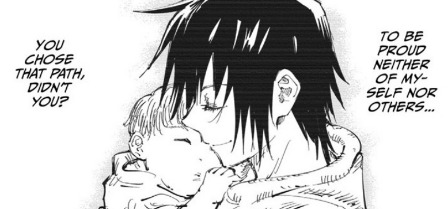
Toji chose to live a life where he only lived to fight and prove he was stronger than the sorcerers who rejected him. He chose it over his own son Megumi, abandoning him in order to continue his lifestyle as a mercenary. He even chose it over continuing to live because he stayed and fought against Gojo to prove he was stronger than the pinnacle of Jujutsu. Toji lives for strength, and he is someone even Gojo respected the strength of, but what else does he have?

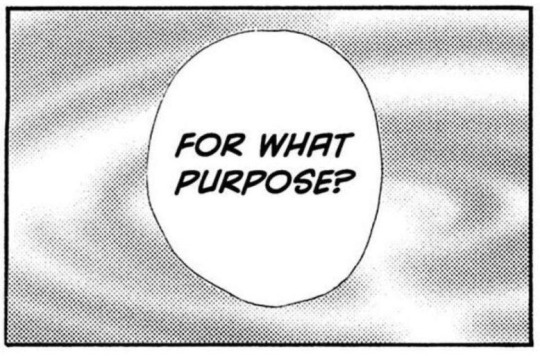
Toji's identity is unstable, he doesn't really live for any purpose, he kills people then blows the money gambling, he jumps from women to women to mooch off of them, he's also mentally unstable as well he shoots a little girl in the back of the head and feels nothing. The instability comes from his isolation, Toji is rejected by everyone the same way that Gojo is lauded by everyone. But Toji goes on step further in that he fails to construct any identity outside of being rejected and his entire life is spent rejecting the people who rejected him. Why does Toji want to be strong, he doesn't know. Purpose is something you have to construct for yourself, because there's no inherent meaning to life. Identity is something that's constructed by both yourself and your interactions with others because people aren't born inherently one thing or the other.
Gojo and Toji just refuse to do this, and only focus on themselves and the goal of being stronger. In Gojo's case I'd argue he doesn't fight for other people because he doesn't feel that connection with other people or rather he doesn't let himself. Hedgehog's dilemna to the extreme. Gojo only fighting for himself isn't Nanami calling him a selfish person who doesn't care about others, it's sad because Gojo never found any other reason to fight or meaning to his life but by getting stronger for its own sake.

Gojo only fights for the sake of satisfying himself, but here's the clincher, he's unsatisfied. Not only did he fail in his goal of giving Sukuna the fight of his life, because he knew Sukuna was holding back on him, but also admits to Geto that what would have really been satisfying is if Geto was there with him to pat him on the back.
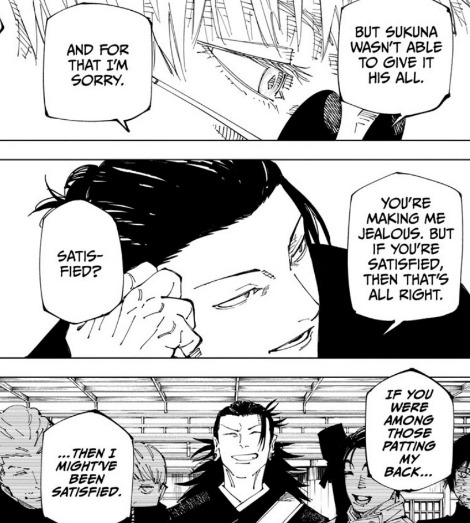
He's failed on both fronts, he's failed at being the strongest and he's failed at making a connection to the people in his life. Gojo and Toji die in pretty much the same way, they die standing up in the middle of battle, but their last thoughts aren't of disappointment that they lost but their loved ones.

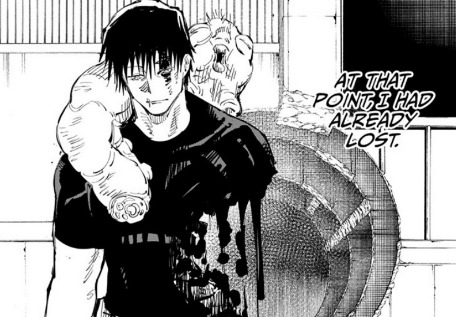
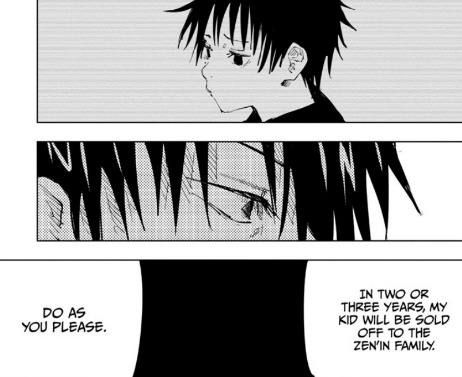
They spent their entire lives believing they were stronger and therefore different than others, and fighting to satisfy their ego and what does it amount to? Toji lived a life of hedonism and then died abandoning the one person he genuinely loved. Gojo has failed his stated goal of revolutionizing Jujutsu Society and dies before he can see whether or not his dream of a reset Jujutsu World will even come to fruition.
They belived they were someone stronger and therefore inherently better, and are put in their place when someone stronger comes along. They die just like all the other mortals. They believed they were alone so they died alone. It's sad and it goes to show how destructive being "the strongest" was to Gojo's identity in the end. Gojo thinks he's Sukuna but Gojo doesn't want to be Sukuna, because Sukuna's alone, and unlike Gojo you could make the point that Sukuna's not a human being who has human emotions because he's a curse. If Gojo was truly someone who could understand Sukuna he would have been truly alone the same way Sukuna is, and that's not what he wanted.
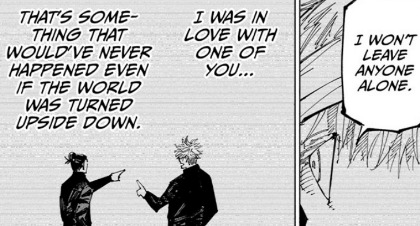
It's too bad Gojo never thought seriously about what he wanted, and therefore learned his lesson too late. He was always looking for someone he could relate to, except for in the people who were right in front of him.
1K notes
·
View notes
Text







3 notes
·
View notes
Text
Well, at least he still think you two are cute

5 notes
·
View notes